 Janus Head Janus Head
10.2
Special Issue
J.H. van den Berg

Beyond Time
New & Selected Work
1977 - 2007
Robert Gibbons
 The Age of Briggs & Stratton The Age of Briggs & Stratton
Peter Culley
|

Tonatiuh Ambrosetti
_______________________
Foraging for Wood on the Mountain
Jack Gilbert
The wild up here is not creatures, wooded,
tangled wild. It is absence wild.
Barren, empty, stone wild. Worn-away wild.
Only the smell of weeds and hot air.
But a place where differences are clear.
Between the mind’s severity and its harshness.
Between honesty and the failure of belief.
A man said no person is educated who knows
only one language, for he cannot distinguish
between his thought and the English version.
Up here he is translated to a place where it is
possible to discriminate between age and sorrow.
A Tribute to Jack Gilbert
May 12, 2009, 7 p.m.
NYU Cantor Film Center, 38 East 8th Street, New York, NY
Jack Gilbert: Notes from a Poet's Well-Observed Life
All Things Considered, April 30, 2006
Jack Gilbert - Poems and Biography
Poetry Foundation
.....................................................
Waiting and Finding
Jack Gilbert
While he was in kindergarten, everybody wanted to play
the tomtoms when it came time for that. You had to
run in order to get there first, and he would not.
So he always had a triangle. He does not remember
how they played the tomtoms, but he sees clearly
their Chinese look. Red with dragons front and back
and gold studs around that held the drumhead tight.
If you had a triangle, you didn’t really make music.
You mostly waited while the tambourines and tomtoms
went on a long time. Until there was a signal for all
triangle people to hit them the right way. Usually once.
Then it was tomtoms and waiting some more. But what
he remembers is the sound of the triangle. A perfect,
shimmering sound that has lasted all his long life.
Fading out and coming again after a while. Getting lost
and the waiting for it to come again. Waiting meaning
without things. Meaning love sometimes dying out,
sometimes being taken away. Meaning that often he lives
silent in the middle of the world’s music. Waiting
for the best to come again. Beginning to hear the silence
as he waits. Beginning to like the silence maybe too much.
_______________________

Boys Playing Over Doorway
Helen Levitt
1940
_______________________
James Agee's Forward to A Way Of Seeing: Photographs of New York by Helen Levitt
 It is in fact hard to get the camera to tell the truth; yet it can be made to, in many ways and on many levels. Some of the best photographs we are ever likely to see are innocent domestic snapshots, city postcards, and news and scientific photographs. If we know how, moreover, we can enjoy and learn a great deal from essentially untrue photographs, such as studio portraits, movie romances, or the national and class types apotheosized in ads for life insurance and feminine hygiene. It is a good deal harder to tell the truth, in this medium, as in all others, at the level of perception and discipline on which an artist works, and the attempt to be "artistic" or, just as bad, to combine "artistry" with something that pays better, has harmed countless photographs for every one it has helped, and is harming more all the time. During the century that the camera has been available, relatively few people have tried to use it at all consistently as an artist might, and of these very few indeed could by any stretch of courtesy be called good artists. Among these few, Helen Levitt is one of a handful who have to be described as good artists, not loosely, or arrogantly, or promotively, but simply because no other description will do. It is in fact hard to get the camera to tell the truth; yet it can be made to, in many ways and on many levels. Some of the best photographs we are ever likely to see are innocent domestic snapshots, city postcards, and news and scientific photographs. If we know how, moreover, we can enjoy and learn a great deal from essentially untrue photographs, such as studio portraits, movie romances, or the national and class types apotheosized in ads for life insurance and feminine hygiene. It is a good deal harder to tell the truth, in this medium, as in all others, at the level of perception and discipline on which an artist works, and the attempt to be "artistic" or, just as bad, to combine "artistry" with something that pays better, has harmed countless photographs for every one it has helped, and is harming more all the time. During the century that the camera has been available, relatively few people have tried to use it at all consistently as an artist might, and of these very few indeed could by any stretch of courtesy be called good artists. Among these few, Helen Levitt is one of a handful who have to be described as good artists, not loosely, or arrogantly, or promotively, but simply because no other description will do.
In every other art which draws directly on the actual world, the actual is transformed by the artist's creative intelligence, into a new and different kind of reality: aesthetic reality. In the kind of photography we are talking about here, the actual is not at all transformed; it is reflected and recorded, within the limits of the camera, with all possible accuracy. The artist's task is not to alter the world as the eye sees it into a world of aesthetic reality, but to perceive the aesthetic reality within the actual world, and to make an undisturbed and faithful record of the instant in which this movement of creativeness achieves its most expressive crystallization. Through his eye and through his instrument the artist has, thus, a leverage upon the materials of existence which is unique, opening to him a universe which has never before been so directly or so purely available to artists, and requiring of his creative intelligence and of his skill, perceptions and disciplines no less deep than those required in any other act of aesthetic creation, though very differently deprived, and enriched.
The kind of beauty he records may be so monumentally static, as it is in much of the work of Mathew Brady, Eugene Atget, and Walker Evans, that the undeveloped eye is too casual and wandering to recognize it. Or it may be so filled with movement, so fluid and so transient, as it is in much of the work of Henri Cartier-Bresson and of Miss Levitt, that the undeveloped eye is too slow and too generalized to foresee and to isolate the most illuminating moment. It would be mistaken to suppose that any of the best photography is come at by intellection; it is, like all art, essentially the result of an intuitive process, drawing on all that the artist is rather than on anything he thinks, far less theorizes about. But it seems quite natural, though none of the artists can have made any choice in the matter, that the static work is generally the richest in meditativeness, in mentality, in attentiveness to the wonder of materials and of objects, and in complex multiplicity of attitudes of perception, whereas the volatile work is richest in emotion; and that, though both kinds, at their best, are poetic in a very high degree, the static work has a kind of Homeric or Tolstoyan nobility, as in Brady's photographs, or a kind of Joycean denseness, insight and complexity resolved in its bitter purity, as in the work of Evans; whereas the best of the volatile work is nearly always lyrical....(more)courtesy of AMERICANSUBURB X
_______________________
Henri Cartier-Bresson - Helen Levitt Side by Side
Laurence Miller Gallery
_______________________
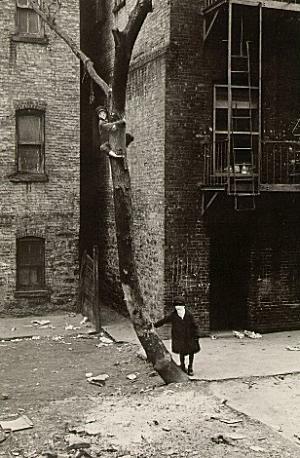
Two Kids in Masks up Tree
Helen Levitt
1940
_______________________
I suppose the idea of rapture has romantic overtones and I’m aware that to speak about aesthetics in terms of rapture seems to focus on a notion of pleasure which is a very old, eighteenth century notion. For me, by contrast, what was important was to really think what it means when you describe aesthetics as a science of sensitive knowing. That gives us a definition of aesthetics, and I liked what that definition suggested for philosophy. It’s too easy to equate thinking with consciousness and mentality, but if you pursue a Freudian line of enquiry, then very quickly you have to relinquish that prejudice and recognise that thought is already ‘of’ the body. If philosophy could abide with that notion, then ethics, epistemology and metaphysics would look quite different.
- Jill Marsden (author of After Nietzsche: Notes Towards a Philosophy of Ecstasy) interview
_______________________
The Morning Half-Life Blues
Marge Piercy
(born 31 March 1936)
Girls buck the wind in the grooves toward work
in fuzzy coats promised to be warm as fur.
The shop windows snicker
flashing them hurrying over dresses they cannot afford:
you are not pretty enough, not pretty enough.
Blown with yesterday’s papers through the boiled coffee morning
we dream of the stop on the subway without a name,
the door in the heart of the grove of skyscrapers,
that garden where we nestle to the teats of a furry world,
lie in mounds of peony eating grapes,
and need barter ourselves for nothing.
not by the hour, not by the pound, not by the skinful,
that party to which no one will give or sell us the key
though we have all thought briefly we found it
drunk or in bed.
...(more)
Marge Piercy - Poems and Biography
Marge Piercy at Representative Poetry On-line
_______________________
The Fundamentals of Gelastics
Justin E. H. Smith
Arthur Danto has noted that every systematic philosopher, whether a refined aesthete or a complete philistine, has at some point taken on the topic of art. One might add that nearly every one of these has included an account of wit, humour, jokes, comedy, or laughter, or some combination of these, within his theory of art and beauty. Why is this? Is gelastics -to borrow a neologism coined by Mary Beard from the Greek 'gelan': 'to laugh'-- a subdomain of aesthetics? Let us consider some of the reasons for holding such a view. (....)
Both the aesthetic and the gelastic, further, bear an important relationship to the ethical, though one that is difficult to account for adequately. Perhaps revealingly, the exclamations “That’s not funny!” and “That’s not art!” seem often to occur in parallel circumstances, and to conceal straightforward moral outrage under the guise of correcting a category mistake. That is, a blasphemous joke is funny (even if cheaply so) just as surely as a Virgin Mary made out of elephant dung is art (even if bad), and the insistance that it is not only serves to move the denouncer outside of the domain of gelastic or aesthetic judgment altogether.
Both are periodically invoked as playing a redemptive role in a world that would be, in their absence, pure nature, determination, disenchantment, etc. Thus in the twenty-first of his Letters on the Aesthetic Education of Man Schiller calls beauty our "second creator," since it is the aesthetic disposition that saves us from "the one-sided compulsion of nature in feeling," and provides "the ultimate gift of humanity, something infinite," namely, freedom. Mutatis mutandis, is this assessment so different from the redemptive power of the Marx Brothers film cited by Woody Allen in Manhattan as the only thing standing between him and death?
There are of course important differences....(more)
_______________________
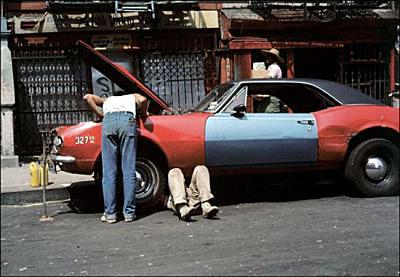
Helen Levitt
_______________________
Tear It Down
Jack Gilbert
We find out the heart only by dismantling what
the heart knows. By redefining the morning,
we find a morning that comes just after darkness.
We can break through marriage into marriage.
By insisting on love we spoil it, get beyond
affection and wade mouth-deep into love.
We must unlearn the constellations to see the stars.
But going back toward childhood will not help.
The village is not better than Pittsburgh.
Only Pittsburgh is more than Pittsburgh.
Rome is better than Rome in the same way the sound
of raccoon tongues licking the inside walls
of the garbage tub is more than the stir
of them in the muck of the garbage. Love is not
enough. We die and are put into the earth forever.
We should insist while there is still time. We must
eat through the wildness of her sweet body already
in our bed to reach the body within that body.
_______________________
The Sycophantic Culture
Henry Pelifian
The voices of American neutrality and objectivity in the mainstream press have either been silenced through censorship or intimidated into sycophancy. Self-censorship has been evident in the so-called public airwaves of television networks where the majority of the American people receive their news. Only recently has there been vocal criticism from professional academics that our policy in the Middle East has been studded with missteps and perpetual disappointment. Where has the vigor of democratic debate been for several generations? Has it been stifled, muffled and muted? In a democracy why are there not alternative views presented in the public airwaves? Are alternative points of view less valid? Or are points of view that contradict the mainstream media’s opinions or views often being blocked and obstructed?
Group think and a Stepford style democracy have marked this era of American national political life in most domestic and foreign policies. New ideas, new ways of solving old problems have seldom emerged in a country which claims to be a citadel and fortress of democracy. The fact that the two major political parties without competition are cementing themselves to the government and the Constitution despite their failures in economically managing the country demonstrates a somnolent populace obediently sycophantic to the two party system. The U.S. Constitution does not mention political parties, therefore, there is no prohibition to other political parties, unless the current parties prevent it or make it extremely difficult which is the case today.
Do government and the educational system consciously remove critics and embrace sycophants? Has group think become a euphemism for sycophancy? Are our strongest potential leaders removed early in the educational process in order to maintain the status quo? Is society often left with those whose skills include sycophancy and pandering? Politicians excel in pandering by constantly telling the American people how great a country they have without creating and establishing meaningful and beneficial change in government programs, for example, in forestalling the current economic meltdown now confronting the nation.
Any society and its military is as only as good as its ability to not only perceive the truth but also use it as its basis for action. A nation of sheep is bred by sycophants. The sycophants are more a danger to society by creating failure than critics who often point the way to human progress and understanding.
Critics, not sycophants, will lead us away from dead ends to the reality of the world we desperately need to comprehend....(more)
_______________________

Helen Levitt
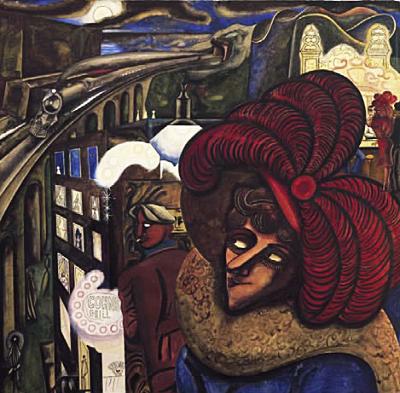
Blues for Ruby Matrix
Edward Burra
(29 March 1905 – 22 October 1976)
_______________________
First Sorrow
Kafka
Translated by Willa and Edwin Muir.
A trapeze artist—this art, practiced high in the vaulted domes of the great variety theaters, is admittedly one of the most difficult humanity can achieve—had so arranged his life that, as long as he kept working in the same building, he never came down from his trapeze by night or day, at first only from a desire to perfect his skill, but later because custom was too strong for him. All his needs, very modest needs at that, were supplied by relays of attendants who watched from below and sent up and hauled down again in specially constructed containers whatever he required. This way of living caused no particular inconvenience to the theatrical people, except that, when other turns were on the stage, his being still up aloft, which could not be dissembled, proved somewhat distracting, as also the fact that, although at such times he mostly kept very still, he drew a stray glance here and there from the public. Yet the management overlooked this, because he was an extraordinary and unique artist. And of course they recognized that this mode of life was no mere prank, and that only in this way could he really keep himself in constant practice and his art at the pitch of its perfection.
Besides, it was quite healthful up there, and when in the warmer seasons of the year the side windows all around the dome of the theater were thrown open and sun and fresh air came pouring irresistibly into the dusky vault, it was even beautiful. True, his social life was somewhat limited, only sometimes a fellow acrobat swarmed up the ladder to him, and then both sat on the trapeze, leaning left and right against the supporting ropes, and chatted, or builders' workmen repairing the roof exchanged a few words with him through an open window, or the firemen, inspecting the emergency lighting in the top gallery, called over to him something that sounded respectful but could hardly be made out. Otherwise nothing disturbed his seclusion; occasionally, perhaps, some theater hand straying through the empty theater of an afternoon gazed thoughtfully up into the great height of the roof, almost beyond eyeshot, where the trapeze artist, unaware that he was being observed, practiced his art or rested. ...(more)
_______________________
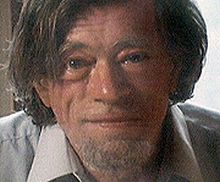
Milton Acorn
(March 30, 1923 - August 20, 1986)
More Poems for People
Milton Acorn
google books
excerpts from: Milton Acorn. Hundred Proof Earth
I have chosen to be a poet, and event by event, decision by decision, I am compelled to repeat that choice. Again, I recognize that this is a choice not only for myself, but for all mankind. This leads me to an aspect of choice which has been taught me by my own experience. To quote from my poem 'Letter To My Red-headed Son':
nothing I've done, no poem, stand,
thought or act of love, hasn't called for
another, stronger deed, or I've lost it.
To elaborate on that, when a choice is made, and the result proves positive, leads to spiritual enrichment and/or the humanization of one's relation with other people, this successful choice results in another choice becoming necessary, usually a choice on a higher level of existence, usually also more difficult. Similarly, when the choice made proves negative, it too leads immediately to another choice, usually on a lower, grimier, more insulting-to-dignity level of existence, and here it is easier to make the choice, especially to make another negative choice. In our present state of society the road of descent is not too long and leads to a condition where not only human values, but the living values that animals have by nature and do not have to strive for, are lost. To quote another of my poems, dealing with the same problem:
I shout LOVE against the proverbs of the damned
which they pause between clubbings and treacheries
to quote with wise communicative nods ... I know
they're lies, but know too
that if I declared a truce in this war
they'd turn into pronged truths and disembowel me.
-
from 'I Shout Love'
It is this perspective of increasingly difficult choices facing one as long as life continues creatively which makes the whole proposition of choice such an agonizing one, so agonizing that I prefer to call it the dilemma of choice. There is only one safeguard against this dilemma, to see that each choice enriches one spiritually, so that one might have the equipment to face the next—more difficult—choice. To look at things from this angle certainly weakens many attitudes that most people take almost for granted, such as that the means may justify the end. Here I must digress a little to remark that most of Sartre's propositions are meant to be understood on the abstract, spiritual plane, and not always absolutely literally. This is something that should be so obvious that Sartre has never, to my knowledge, even bothered to explain it. Nevertheless Sartre's bourgeois critics who, being bourgeois, understand hardly anything abstract or spiritual, even though they are constantly talking about abstraction and the spirit, can't get this through their heads. They persist in understanding him literally, and hence making the most laughable mistakes.
Thus, when I choose to be a poet, I naturally don't choose that the human race shall become a species of poets. The choice for all mankind is in the spiritual content of my decision ... I choose that the whole human race shall be raised to the spiritual level of poetry. ...(more)
_______________________

The Great He-Goat
Francisco Goya
b. March 30, 1746
Goya at the Arno Schmidt Reference Library
Desastres de la guerra (10.6 M) (PDF)
Caprichos (10.0 M) (PDF) _______________________
Under a Flourescent Moon
James Howard Kunstler
Mr. Obama heads to Europe now where official hostility is rising against the Anglo-American method of pounding monetary sand down the rat-holes of “non-performing” debt, bankrupt enterprise, and bubble-levitated bonds. Our poised and charming Prez may escape personal obloquy from the quaint old-world street folk, but most of the other G-20 policy playerz take a dim view of the shell-and-pea games being played by the custodians of the world’s reserve currency, including front-end-loader bank bail-outs, the shuffling of worthless securities under TARPS and TARFS, the desperate efforts to prevent the sane re-pricing of real estate, the cannibalizing of treasuries by the Federal Reserve, the now-notorious hijacking of public “liquidity” injections by third parties like Goldman Sachs, and most generally the perceived sacrifice of everybody else’s greater good for the sake of maintaining Lloyd Blankfein’s cappuccino machine....(more)
_______________________
Jack Spicer on Mars
Jared White
open letters monthly
Consider the name “Jack.” The poet Jack Spicer certainly did. His poetry, finally available after a long period of out-of-print obscurity, echoes through with references to his own name. A poem of admonition is wryly presented “To Jack;” in another poem the “Jack of Spades” materializes in a deck of tarot cards; in a third, an invocation of Shoeless Joe Jackson reshuffles the syllables into the boxer Jack Johnson, Jacks and Jacksons multiplying in an aural hall of mirrors. Even the poetry journal that Spicer briefly published in mimeograph went by the suggestive initial, J, a mere letter away from the autobiographical I. We may not all yet know Jack Spicer, but we all know Jack.(....)
At the heart of his work is a paradox: Spicer means to produce a “pure poetry” that is self-sufficient, magical and ecstatic, yet he freely draws from his own relationships, his obsessions and interests, his thoughts and fantasies and wishes and swoons. He published his work in his lifetime only in small editions barely distributed outside San Francisco (and even in the city he sometimes avoided major poetry bookstores like Lawrence Ferlinghetti’s City Lights). Yet his poetry seeks a conversation that is culturally wide-ranging and engaged with the publishing world, if in a conflicted, splenetic way. His last book, the posthumously published Book of Magazine Verse, proposes a series of poems dedicated to the major periodicals of the day, none of which would have been likely to publish his work. Most would probably have rejected his submissions, if he submitted at all. Thus, this title dramatizes Spicer’s ambivalence: how would parodic “magazine verse” differ from some other kind of poetry, and how can it remain “magazine verse” when published in a book? Ultimately, Spicer implies, this is a question of integrity, of whether poetry advances a poet’s professional, worldly agenda, or speaks for itself....(more)
_______________________

Homage to Goya
Odilon Redon
1895
_______________________
It's the languorous ecstasy,
It's the amorous fatigue,
It's all the shudderings of the woods,
Among the embrace of the breezes,
It is, among the gray boughs,
The chorus of little voices.
Oh, the frail and fresh murmur
That twitters and whispers,
That resembles the soft cry
That rustled grass breathes out . . .
You might say, under the water that swirls,
The dull rolling of pebbles.
That soul that complains
In that sleeping lament
It's ours, is it not? Mine, now, and yours,
Whose humble refrain is breathed out
On this tepid evening, quite low?
-
Paul Verlaine
Paul Verlaine
b. March 30,1844
_______________________

Ships'n Chains
by Klaus Ratzer 1 2
via Shaun Mullen
_______________________
Refuting Critical Bewilderment
in Twentieth Century Australian Poetries
Pam Brown reviews Philip Mead's Networked Language: Culture & History in Australian Poetry
jacket
Poems are made (poesis) out of the solute of ordinary words, even if it is difficult to know exactly how this happens. Broadly speaking, poetics is the name we give to the fractal geometry of textual meanings.
-
Philip Mead: Introduction to Networked Language
Philip Mead’s Networked Language: Culture & History in Australian Poetry is a much needed, dynamic ingression in the tiny field of Australian poetics. Critical writing on poetry in Australia is incredibly scant considering the sizeable publication (and associated activities) of poetry. However, as tiresome as it is to note once more, in spite of its volume and vigour, poetry itself remains marginal to Australian culture.
Practising poets need to read poetics. My own bookshelves house many books of essays on poetry by contemporary North American poets and critics, some European and some from the UK, yet relatively few books on Australian poetics. Strategically, Australian poet-editors use their introductions to infrequent anthologies to gesture towards a poetics. So, Philip Mead is working in a disappointingly small world....(more)
_______________________
Knowing I Live in a Dark Age
Milton Acorn
Knowing I live in a dark age before history,
I watch my wallet and
am less struck by gunfights in the avenues
than by the newsie with his dirty pink chapped face
calling a shabby poet back for his change.
The crows mobbing the blinking, sun-stupid owl;
wolves eating a hamstrung calf hind end first
keeping their meat alive and fresh...these
are marks of foresight, beginnings of wit;
but Jesus wearing thorns and sunstroke
beating his life and death into words
to break the rods and blunt the axes of Rome:
this and like things followed.
Knowing that in this advertising rainbow
I live like a trapeze artist with a headache,
my poems are no aspirins...they show
pale bayonets of grass waving thin on dunes;
the paralytic and his lyric secrets;
my friend Al, union builder and cynic,
hesitating to believe his own delicate poems
lest he believe in something better than himself:
and history, which is yet to begin,
will exceed this, exalt this
as a poem erases and rewrites its poet.
_______________________
 spring rain
Sand Lake
Westport
photo - mw
_______________________
from
Poem in a Mode that Isn't Mine
Max Jacob
Man bears upon himself photographs of his ancestors like Napoleon bore God, o Spinoza! Me, my ancestors, these are the notes of harps. God had conceived St. Helena and the sea between two branches of a tree. My black horse has a good eye, though albino, but he tripped on the harp notes.
3 poems by Max Jacob
translated by Elisa Gabbert and Kathleen Rooney
open letters monthly
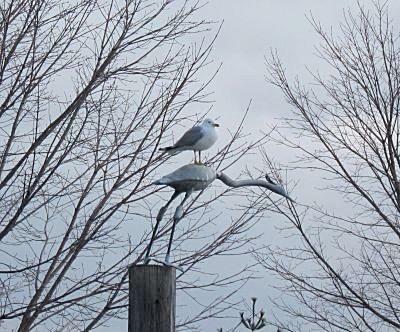
photo - mw
_______________________
The Seagulls Inside My Head
Daniel Green
The Reading Experience
Alain Robbe-Grillet begins his essay "From Realism to Reality" (in For a New Novel) with what must be a truism:
All writers believe they are realists. None ever calls himself abstract, illusionistic, chimerical, fantastic, falsitical. . .Realism is not a theory, defined without ambiguity, which would permit us to counter certain writers with certain others; it is, on the contrary, a flag under which the enormous majority--if not all--of today's novelists enlist. And no doubt we must believe them all, on this point. It is the real world which interests them; each one attempts as best as can to create "the real." (Translation by Richard Howard)
Robbe-Grillet believed himself to be a realist and his attempts at advancing a "new novel" an effort to preserve the possibility of realism in fiction against the insistence of some critics that the novel remain encased in its pre-modern form. "The discovery of reality will continue only if we abandon outworn forms," Robbe Grillet writes. "Unless we suppose that the world is henceforth entirely discovered (and, in that case, the wisest thing would be to stop writing altogether), we can only attempt to go farther. It is not a question of 'doing better,' but of advancing in ways as yet unknown, in which a new kind of writing becomes necessary."
This "new kind of writing" is necessary for realism's sake. Even if it is true that each succeeding generation of writers "has different ideas of reality," that "the classicists believed that it is classical, the romantics that it is romantic, the surrealists that it is surreal," the task of coping with "the objective modifications of reality" that have continued to develop at an ever increasing pace since the 19th century requires that the novel remain open to the kind of formal innovation that might--for the moment, at least--begin to "account for what is real today."...(more)
_______________________

John Paul Caponigro
1 2 3 4 5 6 7
John Paul Caponigro on the State of Printing
O'Reilly podcast
_______________________
design and dasein:
heidegger against the birkerts argument
Dan Piepenbring responds to Sven Birkerts' Resisting the Kindle
if:book
In his seminal Being and Time, Heidegger considers equipment and utility: how we relate to our tools, how the tools relate to one another, and how a network of tools mitigates our surroundings. "Equipment," he avers, "can genuinely show itself only in dealings cut to its own measure". Well-designed tools possess something he dubs "readiness-to-hand." Roughly defined, the more something is suited to the use it is made for, the more ready-to-hand it becomes. Readiness-to-hand entails a kind of integration with the environment, an invisibility; the tool belongs so much in the world that we seldom realize we're using it as we work. So that we may gape at his obscurity, here's how Heidegger puts it:
The peculiarity of what is proximally ready-to-hand is that, in its readiness-to-hand, it must, as it were, withdraw in order to be ready-to-hand quite authentically. That with which our everyday dealings proximally dwell is not the tools themselves. On the contrary, that with which we concern ourselves primarily is the work -- that which is to be produced at the time; and this is accordingly ready-to-hand too. The work bears with it that referential totality within which the equipment is encountered.
Consider, for example, a computer keyboard. When I type on mine, I'm ordinarily unaware of it. Since it's well-designed and fully functioning, I have no phenomenological reason to take notice of its existence -- instead, I concentrate on what I'm typing. The keyboard is incorporated in my location, existing in tandem with my monitor, my lamp and, yes, the intimidating paperback edition of Being and Time resting on my desk.
Of course, if the keyboard broke, or if it were inherently flawed, this wouldn't be the case, and it's for this reason that Heidegger introduces "obtrusiveness," one way of distinguishing between well-wrought equipment and defective tools. The latter make us increasingly aware of their presence and less at ease in our environs; they simply don't seem to fit into the world as we've constructed it. This is the last time I'll quote our man:
When we notice what is un-ready-to-hand, that which is ready-to-hand enters the mode of obtrusiveness. The more urgently we need what is missing, and the more authentically it is encountered in its un-readiness-to-hand, all the more obtrusive does that which is ready-to-hand become -- so much so, indeed, that it seems to lose its character of readiness-to-hand. It reveals itself as something just present-at-hand and no more, which cannot be budged without the thing that is missing. The helpless way in which we stand before it is a deficient mode of concern, and as such it uncovers the Being-just-present-at-hand-and-no-more of something ready-to-hand.
...(more)
_______________________

from the series The Doors of Paris
Oscar Monzón
via The Bartender Never Gets Killed
_______________________
The Annoying Lacuna:
One Unofficial History of the Oulipo
Christopher Higgs
AGNI
You are about to begin reading my new essay on the experimental literary group known as the Ouvroir de la Littérature Potentielle: The Sewing Circle of Potential Literature. Please be aware that every single fact herein is absolutely 100% true . . . I think. So relax. Concentrate. Dispel every other thought.
We must begin with some necessary backtracking, unpacking, detangling of roots; down the long trail of antecedents, back to the Nineteenth century science of imaginary solutions known as Pataphysics, which, according to Alfred Jarry, the leader of the movement, deals with “the laws which govern exceptions and will explain the universe supplementary to this one; or, less ambitiously, will describe a universe which can be—and perhaps should be—envisaged in the place of the traditional one.” For it is here that we locate the big bang responsible for the creation of the Oulipo.
Pataphysicians believed in the truth of contradictions and exceptions. They did not believe in truth or other provable unprovables. They firmly believed in not believing in things, and especially believed only in facts that could not be proven to be unprovable or visa versa. They also disliked ice cream, cake, and all other desserts. Spearheaded by Jarry, these anti-dessert-eating literary explorers sliced a gash in space-time and established the first productive European avant-garde collective. ...(more)
_______________________
Revisiting The Natural Contract
Michel Serres
translation by Anne-Marie Feenberg-Dibon
ctheory
As soon as human technology started using heat, vaporous mixtures expanded everywhere in all directions and at random; recent core sampling of glacial inlandsis have been able to date the beginning of the bronze age almost to the year, thanks to traces of the first effluents emitted by archaic ovens in the Middle East which were dispersed everywhere and carried by snowfall to those high latitudes. Who would have thought that globalization started as early as our prehistory?
The industrial revolution generalized and propagated thermal techniques which accelerated the rise of the local towards the global, the causes or consequences of which philosophy has not yet studied. Since I frequently described this rise in previous books, The Natural Contract begins by simply mentioning it. Our know-how has been dedicated in recent times to the production of world-objects, a concept that I defined twenty-five years ago in Thanatocracy (Hermes III, p. 101), taking as examples ballistic missiles, fixed satellites and nuclear waste. By world-objects I mean tools with a dimension that is commensurable with one of the dimensions of the world. A satellite for speed, an atomic bomb for energy, the Internet for space, and nuclear waste for time...these are four examples of world-objects. (....)
We do not know what the world is like today; we are only beginning to know it and this knowledge differs from our knowledge of a circumscribed object. We are just beginning to act on the world and this practice differs from our action on circumscribed objects.
Therefore philosophy's task is to re-examine ancient concepts such as the subject, whether individual or collective, the object, knowledge and action. Those concepts developed over millennia, at least in the West, under the prior condition of local divisions which defined a gap between subject and object in which action and knowledge operated. The measure of that gap conditioned them. Local division, distance, measure... this whole production of theories and practices is falling apart today as we enter a broader scene. Older categories of totality such as being-in-the-world become concerns of objective knowledge, relevant to the problem of politics and technical action. Thus they go from metaphysics to physics, from speculation to action, from ontology to responsibility, from ethics to politics.
A certain nature, not in the common meaning of the term, but in its purely etymological sense, is being born which is new for our globalized knowledge and acts. (....)
The 20th century built global world-objects but could only think in terms of the old local philosophies. ...What can we say about power, that is to say, politics, when exercising it endangers not only the knight with his amour, or his family, his tribe, his group or nation, but all of humanity, the planet included? Here too, the scale has changed. The question of power concerns not only war and politics, but also technical action and its tools. And as usual, the law follows death.
The law I propose follows the new death. Certain elements of world opinion and politics during the next years of the 21st century will be linked to these legal questions.
And so I prefer Goya's painting the description of which opens The Natural Contract to the master-slave dialectic. A pair of enemies are fighting in quicksand. With every blow dealt to the adversary, their legs sink into the sludge, ever deeper as the energy spent in combat increases. Since the dawn of history, we have only seen the belligerents in the grand spectacle of the battle and have only been interested in the question of who will win or lose, who will become the master by subduing or killing the slave?
However, the game is no longer played by two parties, but by three; no longer two subjects, but a pair and the object. Which object? not the local object of a now trivial debate, but the global habitat; no longer the individual case, but the universe of things reacting strongly to the conditions of the struggle. In the past, we signed temporary peace treaties between belligerents; today we must sign contracts of symbiosis between the global Earth and the totality of actors. For, in spite of their hatred and the force of their blows, these actors actually struggle, in agreement and in unison, with their habitat....(more)
The troubadour of knowledge
Michel Serres
Translated by Sheila Faria Glaser, William Paulson google books
The Natural Contract
Michel Serres
Translated by Elizabeth MacArthur, William Paulson
google books
_______________________

photo - mw
_______________________
Currency
Geraldine McKenzie
jacket
they won’t be satisfied and spin
the daily bruit the daily black and white disgorging
what maw some maelstrom
caught up in events as seems we are
rowdy roasts with one eye on the cameras
big man big man carrot and stickup
talked down and out who’s counting
between them crush and dwindle
what wasn’t light or peace or hope
but passed as precious
irretrieveable
mud morrow now where morning blight
it’s eerily sincere
sounds like next or never mind
and free’s a flag for burning
to this they bring us
choking at the trough or trope
barely breath a babble bauble
meant like murder
while I wake as someone else’s mother
to weigh my children deathwards
even the scholars
sitting out disaster on the verandah
find themselves
swimming into history
More of Geraldine McKenzie's poems in Jacket
1 2 3 4
and in the How2 special feature on Australian writing
Note: if you track down a lot of poetry on the net Joseph Mosconi's Google Poetry Search Engine is very useful.

Window with no view
Reflective Vision
Dorothy Simpson Krause
_______________________
who's listening?
Mark Scroggins
I spent a lot of time thinking about audience in respect to the LZ biography; I wanted to write a book that would appeal to someone other than the 250 people who came to the Columbia LZ centenary celebration, or the 100 who'd read LZ & the Poetry of Knowledge. I wanted to write a book that would introduce & open up LZ to people who'd heard the name but kept confusing him with Bukowski. I wanted, I sometimes told myself, to target the New Yorker readers who thought they knew something about contemporary poetry but hadn't read past Robert Lowell. I was pretty disheartened when my editor decided that he should allow the book its "scholarly tone" – a tone I was precisely trying to avoid – & even more irritated when one blogger called the book "every bit as stiff as the author's portrait on the dust jacket" (ouch!). But the bio did provide me something I hadn't gotten before: for a while, a pretty steady stream of readerly feedback, most of it positive; for once, I felt like I wasn't writing into an empty room....(more)
The Poem of a Life: A Biography of Louis ZukofskyMark Scroggins amazon
‘To write poems is not enough if they do not keep the life that has gone’ : a Zukofskian biography between Erlebnis and Ereignis
Nicholas Manning
jacket
There is a tendency, in the reviewing of biographies, to talk more of the biography’s nominal ‘content’ than of its general methodology. This trend surreptitiously intimates that biographical writing does not require, for each instance, its own complex and unique vision, to be suited in each case to the ‘life’ the reader would like to live momentarily, and partially know.
I say this because I am less interested here in detailing for the reader the dates, names and occurrences of Louis Zukofsky’s ‘lived experience’ — for that I invite you to buy the book here under review — than I am in talking of the way in which Mark Scroggins sets about dealing with his subject in a singularly innovative way. ...(more)
_______________________
 tarnished trees
Losing Ground
Dorothy Simpson Krause
The Process of Making Losing Ground
The landscapes between photography and painting
Dorothy Simpson Krause
Camera Obscura
_______________________
Oliver Cromwell
Mark Scroggins
(for Steven Moore)
He read of children tossed
at a pike’s end, of cannons
with “God Is Love” scribed round
their barrels. He read of a snake
with garnet eyes, of golden
ringlets curling round the hemp
of a hangman’s noose.
He read of green fields
and mines, of foundries
and factory floors. Pleasures
and game diversions. The tree
which bursts into pink blossoms
of enthusiasm. The trees huddle
suspiciously in the wind, rustle
in green whispers. A village mashed
and shattered under the sun, not one
stone left upon another. Bombers
and fighter jets darkening the sun,
the shop clerk whose weekend sends
him – in militiaman’s uniform –
to take stock – with a bayonet– of a
tentful of refugees. Great men,
whose brows line with the effort
of shaping destiny. Who read old books,
and find their faces there.
Mark Scroggins poems - Marsh Hawk Review
The Piety of Terror:
Ian Hamilton Finlay, the Modernist Fragment, and the Neo-classical Sublime
Mark Scroggins jacket.....................................................
Damage Poem
Mark Scroggins
flashpoint
Consider the poem as killing machine, sharpened word-gears
turning word-gears, greased and shining engine-block of pornographic
technology – not the catherine-wheel of "genuine" emotion rising
from the swamp of tranquil reflection. It twists
the threads of Penelope's loom into knotted elf-locks,
seeds the reader's browser with subversive cookies:
the poem as vicious animal; the poem as
tumor, bulbous and unclipped umbilicus. No more poems
as consolation. I want the poem as damage.
_______________________
 Gregory Corso
(March 26, 1930 – January 17, 2001)
Gregory Corso, Poetus Magnus
in his alchemic Attic
9 Rue Gît-Le-Coeur
photo by Allen Ginsberg
from
The American Way
by Gregory Corso
2
They are frankensteining Christ in America
in their Sunday campaigns
They are putting the fear of Christ in America
under their tents in their Sunday campaigns
They are driving old ladies mad with Christ in America
They are televising the gift of healing and the fear of hell
in America under their tents in their Sunday
campaigns
They are leaving their tents and are bringing their Christ
to the stadiums of America in their Sunday
campaigns
They are asking for a full house an all get out
for their Christ in the stadiums of America
They are getting them in their Sunday and Saturday
campaigns
They are asking them to come forward and fall on their
knees
because they are all guilty and they are coming
forward
in guilt and are falling on their knees weeping their
guilt
begging to be saved O Lord O Lord in their Monday
Tuesday Wednesday Thursday Friday Saturday
and Sunday campaigns
3
It is a time in which no man is extremely wondrous
It is a time in which rock stupidity
outsteps the 5th Column as the sole enemy in America
It is a time in which ignorance is a good Ameri-cun
ignorance is excused only where it is so
it is not so in America
Man is not guilty Christ is not to be feared
I am telling you the American Way is a hideous monster
eating Christ making Him into Oreos and Dr. Pepper
the sacrament of its foul mouth
I am telling you the devil is impersonating Christ in America
...(more)
_______________________
 thorns
sacred spaces
Dorothy Simpson Krause
_______________________
BOMB
Gregory Corso
Budger of history Brake of time You Bomb
Toy of universe Grandest of all snatched sky I cannot hate you
Do I hate the mischievous thunderbolt the jawbone of an ass
The bumpy club of One Million B.C. the mace the flail the axe
Catapult Da Vinci tomahawk Cochise flintlock Kidd dagger Rathbone
Ah and the sad desparate gun of Verlaine Pushkin Dillinger Bogart
And hath not St. Michael a burning sword St. George a lance David a sling
Bomb you are as cruel as man makes you and you're no crueller than cancer
All Man hates you they'd rather die by car-crash lightning drowning
Falling off a roof electric-chair heart-attack old age old age O Bomb
They'd rather die by anything but you Death's finger is free-lance
Not up to man whether you boom or not Death has long since distributed its
categorical blue I sing thee Bomb Death's extravagance Death's jubilee
Gem of Death's supremest blue The flyer will crash his death will differ
with the climbor who'll fall to die by cobra is not to die by bad pork
Some die by swamp some by sea and some by the bushy-haired man in the night
O there are deaths like witches of Arc Scarey deaths like Boris Karloff
No-feeling deaths like birth-death sadless deaths like old pain Bowery
Abandoned deaths like Capital Punishment stately deaths like senators
And unthinkable deaths like Harpo Marx girls on Vogue covers my own
I do not know just how horrible Bombdeath is I can only imagine
Yet no other death I know has so laughable a preview I scope
a city New York City streaming starkeyed subway shelter
Scores and scores A fumble of humanity High heels bend
Hats whelming away Youth forgetting their combs
Ladies not knowing what to do with their shopping bags
Unperturbed gum machines Yet dangerous 3rd rail
Ritz Brothers from the Bronx caught in the A train
The smiling Schenley poster will always smile
Impish death Satyr Bomb Bombdeath
Turtles exploding over Istanbul
The jaguar's flying foot
soon to sink in arctic snow
Penguins plunged against the Sphinx
...(more)
.....................................................
Gregory Corso Selected Poems
The Happy Birthday of Death
Gregory Corso
google books
Herald of the autochthonic spirit
Gregory Corso
google books
An accidental autobiography: the selected letters of Gregory Corso
google books
The American Express
Gregory Corso
Corso's only novel
google books _______________________
Ozone Park
Premiere Issue
a biannual online journal of new writing publishing Fiction, Poetry, Creative Nonfiction, Plays and Translation from emerging and established writers. Ozone Park is edited and designed by graduate students in the Queens College MFA in Creative Writing and Literary Translation program of the City University of New York.
via NewPages Blog_______________________
Triple Canopy - Idol Traffic, Issue 5
_______________________

photo - mw
_______________________
The Summer Of The Web
Levi Asher
chapter ten of his memoir of the internet industry
The summer of 1995 would have suited Heraclitus: it was a summer of constant change. It was hard to keep up with everything that was changing. For instance, now I was wearing t-shirts and jeans instead of dress shirts and ties to work. But it had happened so fast, I'd forgotten to even enjoy the change.
A general hysteria seemed to sweep the software development industry around this time. It's a funny thing that in June of that year several of my Sybase colleagues told me (especially at the tail end of my drunken farewell party at a midtown steak club) that they thought I was insane to leave booming Wall Street for a frivolous Internet start up in midtown.
By the end of August, they all knew I'd placed the right bet by joining a dot-com. All they had to do was read the Wall Street Journal. Big money had arrived in little Silicon Alley, and now the Internet was really hot, and getting hotter. ...(more)
Levi Asher is propietor of Literary KicksLitKicks was born on July 23, 1994.

(Juxtapositions)
in this instance
Conrad Veidt and Lupe Velez
1928
Edward Steichen
1 2
_______________________
It is indeed getting more and more difficult, even pointless, for me to write in formal English. And more and more my language appears to me like a veil which one has to tear apart in order to get to those things (or the nothingness) lying behind it. Grammar and style! To me they seem to have become as irrelevant as a Biedermeier bathing suit or the imperturbability of a gentleman. A mask. It is to be hoped the time will come, thank God, in some circles it already has, when language is best used when most efficiently abused. Since we cannot dismiss it all at once, at least we do not want to leave anything undone that may contribute to its disrepute. To drill one hole after another into it until that which lurks behind, be it something or nothing, starts seeping though–I cannot imagine a higher goal for today’s writer.
Or is literature alone to be left behind on that old, foul road long ago abandoned by music and painting? Is there something paralysingly sacred contained within the unnature of the word that does not belong to the elements of the other arts? Is there any reason why that terrifyingly arbitrary materiality of the word surface should not be dissolved, as, for example, the sound surface of Beethoven’s Seventh Symphony is devoured by huge black pauses, so that for pages on end we cannot perceive it as other than a dizzying path of sounds connecting unfathomable chasms of silence? An answer is requested.
The Letters of Samuel Beckett, 1929-1940
quoted by Wyatt Mason
harper's
_______________________

Webster two point oh
detail
Brian Dettmer
2008
1 2 3 4
_______________________
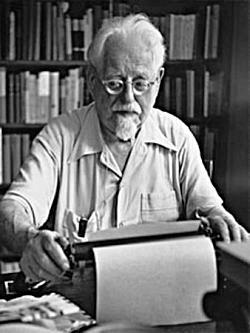
Rudolf Rocker
Anarchist Librarian
March 25, 1873 - September 19, 1958
The Reproduction of Daily Life
Rudolf Rocker
The Tragedy of Spain
history of the Spanish Civil War and Revolution
Rudolf Rocker
_______________________
On the Possibility of Formless Life: [pdf]
Agamben’s Politics of the Gesture
René ten Bos
One of Agamben’s major claims is that it is exactly these dimensions that became a strategic objective for modern politics. This is why modern politics is essentially a biopolitics. (Indeed, with hindsight one might say that the Greek treatment of barbarians, slaves and women were an instance of bio-politics as well. Foucault is therefore wrong in claiming that bio-politics is a modern phenomenon. His claim was right to the extent that it alerted us to the exceptionality of bio-politics in the Ancient world.) Modern politics no longer focuses primarily on humanity as a well-defined form (citizen, king, employee, functionary, president, and so on) but increasingly also on the less-thanhuman (life itself, bare life, bodily life, animal life). Agamben writes more or less extensively about animals, children, embryos, the proletariat of modern cities, angels, drifters, comatose patients, refugees, prisoners, inmates of concentration camps, indeed, about death itself. Put otherwise, he writes about anthropomorphic creatures that somehow have not actualised their fully-fledged human form or have lost their form. In this sense, his work seems to resonate particularly well with a number of recent studies in history or in art history about extreme violence that renders people formless, wordless, or faceless. (....)
The stakes of Agamben’s philosophy are enormous. To understand why we must briefly consider some of his intuitions about the relationship between death and language.
Writing:Labourephemera volume 5, number 1 (Feb 2005)
ephemera:
theory & politics in organization
_______________________
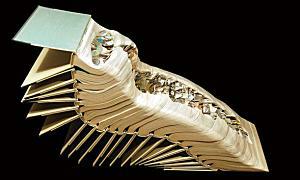
altered books and altered media
Brian Dettmer
Packer Schopf Gallery
_______________________
An Obscure Apostle
A Dramatic Story
Eliza Orzeszko
Translated By C.S. De Soissons
On the summits of civilisation the various branches of the great tree of humanity are united and harmonised. Education is the best apostle of universal brotherhood. It polishes the roughness without and cuts the overgrowth within; it permits of the development, side by side and with mutual respect, of the natural characteristics of different individuals; it prunes even religious beliefs produced by the needs of the time, and reduces them to their simplest expression, the result being that people can live without antipathies.
Quite a different state of affairs exists in the social valley unlighted by the sun of knowledge. There people are the same to-day as they were in the remote centuries. Time, while making tombs for the dead people, has not buried with them the forms which, being continually regenerated, create among amazed societies unintelligible anachronisms. Here exist distinctions which, with sharp edges, push back everything which belongs not to them; here are crawling moral and physical miseries which are unknown, even by name, to those who have reached the summits; here is a gathering of dark figures, standing out against the background of the world, resembling vague outlines of sphinxes keeping guard over the graveyards; here are widely-spread petrifications of faiths, sentiment and customs, testifying by their presence that geniuses of many centuries can simultaneously rule the world. Patricians and plebeians changed their formal parts. The first became defenders and propagators of equality; the second stubbornly hold to distinctions. And if in times of yore oppression was directed by those who stood high against those who, in dust and humility, swarmed in the depths, in our times, from the depths arise unhealthy exhalations, which poison life and make the roads of civilisation difficult to the chosen ones.(....)
Well then, readers, I am going to make you acquainted with that deep--very deep--social valley. Not long ago there was enacted there an interesting drama worthy of your kind glance--of your heart's strong throb and a moment of long, sad thought. But in order to bring out facts and figures they must be thrown against the background on which they have risen and developed, and in the deep perspectives of which there are elements which are the causes of their existence. Therefore you must permit me, before raising the curtain which hides the first scenes of the drama, to tell you in brief the history of the small town....(more)
Polish Writing
_______________________

El Ateneo in Buenos Aires
Photography by sitemarca Flickr.com
Most Interesting Bookstores of the World via Conversational Reading
_______________________
The Library of Babel
Jorge Luis Borges
Translated by J. E. I.
The universe (which others call the Library) is composed of an indefinite and perhaps infinite number of hexagonal galleries, with vast air shafts between, surrounded by very low railings. From any of the hexagons one can see, interminably, the upper and lower floors. The distribution of the galleries is invariable. Twenty shelves, five long shelves per side, cover all the sides except two; their height, which is the distance from floor to ceiling, scarcely exceeds that of a normal bookcase. One of the free sides leads to a narrow hallway which opens onto another gallery, identical to the first and to all the rest. To the left and right of the hallway there are two very small closets. In the first, one may sleep standing up; in the other, satisfy one’s fecal necessities. Also through here passes a spiral stairway, which sinks abysmally and soars upwards to remote distances. In the hallway there is a mirror which faithfully duplicates all appearances. Men usually infer from this mirror that the Library is not infinite (if it were, why this illusory duplication?); I prefer to dream that its polished surfaces represent and promise the infinite... Light is provided by some spherical fruit which bear the name of lamps. There are two, transversally placed, in each hexagon. The light they emit is insufficient, incessant.
Like all men of the Library, I have traveled in my youth; I have wandered in search of a book, perhaps the catalogue of catalogues; now that my eyes can hardly decipher what I write, I am preparing to die just a few leagues from the hexagon in which I was born. Once I am dead, there will be no lack of pious hands to throw me over the railing; my grave will be the fathomless air; my body will sink endlessly and decay and dissolve in the wind generated by the fall, which is infinite. I say that the Library is unending. The idealists argue that the hexagonal rooms are a necessary from of absolute space or, at least, of our intuition of space. They reason that a triangular or pentagonal room is inconceivable. (The mystics claim that their ecstasy reveals to them a circular chamber containing a great circular book, whose spine is continuous and which follows the complete circle of the walls; but their testimony is suspect; their words, obscure. This cyclical book is God.) Let it suffice now for me to repeat the classic dictum: The Library is a sphere whose exact center is any one of its hexagons and whose circumference is inaccessible....(more)
_______________________
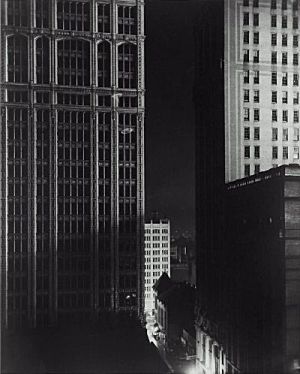
Sunday Night
40th Street
Edward Steichen
1925
_______________________
Hypertextual & Illustrated Companion to Malcolm Lowry's Under the Volcano
Chris Ackerley
via mosses from an old manse

Chargesheimer
_______________________
I Am Waiting
Lawrence Ferlinghetti
I am waiting for my case to come up
and I am waiting
for a rebirth of wonder
and I am waiting
for someone to really discover America
and wail
and I am waiting
for the discovery
of a new symbolic western frontier
and I am waiting
for the American Eagle
to really spread its wings
and straighten up and fly right
and I am waiting
for the Age of Anxiety
to drop dead
and I am waiting
for the war to be fought
which will make the world safe
for anarchy
and I am waiting
for the final withering away
of all governments
and I am perpetually awaiting
a rebirth of wonder
(....)
I am waiting
to get some intimations
of immortality
by recollecting my early childhood
and I am waiting
for the green mornings to come again
youth’s dumb green fields come back again
and I am waiting
for some strains of unpremeditated art
to shake my typewriter
and I am waiting to write
the great indelible poem
and I am waiting
for the last long careless rapture
and I am perpetually waiting
for the fleeing lovers on the Grecian Urn
to catch each other up at last
and embrace
and I am waiting
perpetually and forever
a renaissance of wonder
...(more)
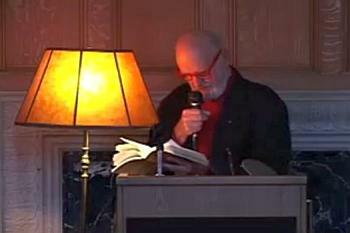
Lunch Poems: Lawrence Ferlinghetti
2006
youtube - 48 min Lawrence Ferlinghetti
b. March 24, 1919
A Coney Island of the Mind: Poems
Lawrence Ferlinghetti
google books
Americus: Book I
Lawrence Ferlinghetti
google books
City lights pocket poets anthology
google books
includes poetry by:
Lawrence Ferlinghetti, Kenneth Rexroth, Kenneth Patchen, allen Ginsberg, Marie Ponsot, Denise Levertov, Gregory Corso, Jacques Prevert, Robert Duncan, Jerome Rothenberg, Nicanor Parra, Robert Nichols, anselm Hollo, Malcolm Lowry, Frank O'Hara, Philip Lamantia, Bob Kaufman, Janine Pommy-Vega, Charles Upton, Pablo Picasso, Robert Bly, Diane di Prima, Jack Kerouac, andrei Voznesensky, Pete Winslow, Harold Norse, anne Waldman, Jack Hirschman, Stefan Brect, Peter Orlovsky, antler, Pier Paolo Pasolini, Ernesto Cardenal, antonio Porta, adam Cornford, La Loca, Vladimir Mayakovsky, Daisy Zamora, Rosario Murillo, and alberto Blanco.
_______________________
29
Laura Carter
post-dérives
There's a somnambulist who does not cross a frontier; there’s a somnambulist following me through the woods carrying a wheel. It radiates, it doesn't radiate enough.... I stop her with a theory. I wait, I take a path. I take out my cache. I wrap my belongings in a velvet pouch and throw it in the river. The path breaks off into two other paths. I choose a path. The somnambulist will not mottle but quietly sings me a sequence. She sings me a plot: there will be no more interviews, no harpist playing endless songs (rêves). Theory: bibliography of tonality, and I will make this bibliography for myself....(more)
_______________________

off-season
Ralph Ballerstadt
via Julian Thomas
The Bartender Never Gets Killed
_______________________
Latta: Clark | Kerouac | Alluvial Deposits
damn the caesars
To come across a blog that's not merely information, caster oil or any other pharmaceutical we desperately need but don't necessarily want. To encounter something else. What is a pleasure to read — that jumps and bumps with the same force rhythm speed differentiation and wildly shifting registers that first drew me as a young man to Melville, Crane, Hopkins, WCW, Pound, Olson, Loy, Howe &c — the big guns that made reading a pleasure and not a duty. Like throwing a record on the turntable or pulling a book from the shelf when one doesn't want to work. When one has had enough of work. This is Latta's Isola di Rifiuti. A blessing that strategically understates itself....(more)
_______________________
 Chargesheimer
_______________________
Didn’t We All See This Coming?
Timothy V. Gatto
The country is coming to conclusions that a year ago would be unthinkable. The current turmoil on Wall Street has convinced many Americans of something that has been said for years, but nobody really believed…entirely. That something was that lawyers and bankers cannot be trusted. The American people know by now that the advice is largely true, they can’t be trusted. Neither can politicians, stockbrokers and financial advisors. In fact, people are starting to realize the entire concept of capitalism can’t be trusted, not just for the average Joe, but for the entire country. Capitalism is not your friend; it never has been and will not be in the future. It will continue to feed the rich, in fact, more than just feed them, but it won’t help the average wage earner realize the American dream. That’s never what it was designed to do. It was put in place to insure that the rich got richer and that the not so rich would stay where they were and to be grateful they could feed their families.
This isn’t the first time that capitalism has failed. Every time it fails we use a form of temporary socialism to shore up the economy. When things start to return to normal, we give everything back to the capitalists. Why is that? Could it be that we have no choice?
Ever notice how people equate capitalism with belief in God and country? They defend capitalism as if any other kind of government will lead them into slavery. The truth is that capitalism is an express ticket into slavery. Still, for every worker that recites a story of abject horror, there is an example of how the shining example of individualism embodied in the dogma of “free enterprise” has lifted a poor person out of his or her misery into nirvana. Pulling yourself up from your bootstraps is another way of contributing to the myth that capitalism works for everyone. I would like to see the ratio of millionaires that inherited their wealth vs. those that made their own money. If it were true that people surmounted the difficulties of amassing wealth and that many had truly “made it on their own”, the empirical evidence would be touted from every capitalist media outlet to every citizen in the country, just to prove that “free enterprise” works, yet it just isn’t there. ...(more)
_______________________
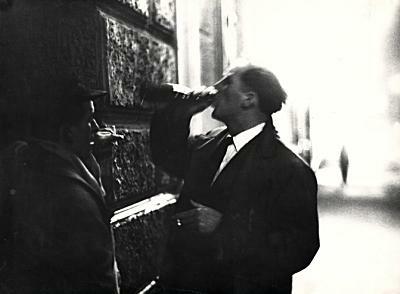
Heinrich Böll
1955
Chargesheimer
1924 - 1971
Galerie Priska Pasquer
via
_______________________
Myth America
Cindy Sheehan
Since this country was founded, it has been governed, or controlled by the Robber Class. Some people call our “Lords,” the Ruling Class, the Oligarchy, the Kleptocracy, or Plutocracy. Some call our system Cronyism, a Democratic Tyranny, Soft-core Fascist State, or if you are a member of the Robber Class or Blinded Robbed Class, you call it a Democracy, or Republic....(more)
_______________________
No Return To Normal
Why the economic crisis, and its solution, are bigger than you think.
James K. Galbraith
_______________________
 Ralph Ballerstadt
_______________________
The Big Takeover
The global economic crisis isn't about money - it's about power. How Wall Street insiders are using the bailout to stage a revolution
Matt Taibbi
As complex as all the finances are, the politics aren't hard to follow. By creating an urgent crisis that can only be solved by those fluent in a language too complex for ordinary people to understand, the Wall Street crowd has turned the vast majority of Americans into non-participants in their own political future. There is a reason it used to be a crime in the Confederate states to teach a slave to read: Literacy is power. In the age of the CDS and CDO, most of us are financial illiterates. By making an already too-complex economy even more complex, Wall Street has used the crisis to effect a historic, revolutionary change in our political system — transforming a democracy into a two-tiered state, one with plugged-in financial bureaucrats above and clueless customers below.
The most galling thing about this financial crisis is that so many Wall Street types think they actually deserve not only their huge bonuses and lavish lifestyles but the awesome political power their own mistakes have left them in possession of. When challenged, they talk about how hard they work, the 90-hour weeks, the stress, the failed marriages, the hemorrhoids and gallstones they all get before they hit 40.
"But wait a minute," you say to them. "No one ever asked you to stay up all night eight days a week trying to get filthy rich shorting what's left of the American auto industry or selling $600 billion in toxic, irredeemable mortgages to ex-strippers on work release and Taco Bell clerks. Actually, come to think of it, why are we even giving taxpayer money to you people? Why are we not throwing your ass in jail instead?"
But before you even finish saying that, they're rolling their eyes, because You Don't Get It. These people were never about anything except turning money into money, in order to get more money; valueswise they're on par with crack addicts, or obsessive sexual deviants who burgle homes to steal panties. Yet these are the people in whose hands our entire political future now rests.
Good luck with that, America. And enjoy tax season....(more)

Le Pierrot au livre
1924
Juan Gris
_______________________
The Flesh of Words: The Politics of Writing
Jacques Rancière
Trans. Charlotte Mandell
mediafire pdf
So a strange game is played between words and their body. Since Plato and the Cratylus it has been understood that words do not resemble what they say. That is the price of thought. Any resemblance must be resisted. But, by identifying this resemblance with the poetic lie, Plato gave himself too easy a task. For poetry and fiction have the same demand. That is what Mallarrne says, correcting his crarylian reveries of an amateur philologist with the poet's rigor. If chance had not made the very sound of nuit [night] light and that of jour [day] dark, verse would not exist, which rewards the faults of language, and makes only the absent one of all flowers rise up.
But doesn't this condemnation of resemblance, which modern poetry has inherited from ancient philosophy, itself settle the question too quickly? For there are many ways of imitating, and many things that can be resembled. And when it was said that sound did not resemble meaning, or that a sentence was like no object in the world, only the most obvious of the doors through which words can go toward what are not words has been closed. And the least essential, too. For it is not by describing that words acquire their power: it is by naming, by calling, by commanding, by intriguing, by seducing that they slice into the naturalness of existences, set humans on their path, separate them and unite them into communities. The word has many other things to imitate besides its meaning or its referent: the power of speech that brings it into existence, the movement of life, the gestures of an oration, the effect it anticipates, the addressee whose listening or reading it mimics beforehand: "Take, read!", "Reader, throwaway this book." If resemblance in painting is denounced, isn't that because it fixes all movements on one single plane? That indeed is what the criticism of [Plato's] Phaedrus definitively tells us when it denounces the vain portrayal of Logos presented by the silent letters of the script. The problem is not that the resemblance is unfaithful, but that it is too faithful, still attached to what has been said when already it should be elsewhere, near where the meaning of what has been said must speak. The written letter is like a silent painting that retains on its body the movements that animate the logos and bring it to its destination. The chattering silence of the dead letter blocks the multiple powers by which the Logos constitutes its theater, imitates itself to perform living speech, to travel the path of its oration, to become seed able to bear fruit in the soul of the disciple. And the entire text of Phaedrus is only the deployment of all the luxuries by which writing exceeds itself in the mime of living speech, of speech on the march that traverses all the figures of discourse in movement: walking around, dialogue, debate, parody, myth, oracle, prayer.
This is the theater that will be at issue here, the way a text gives itself the body of its incarnation to escape the fate of the letter released into the world, to mime its own movement between the place of thought, of mind, of life, whence it comes, and the place toward which it heads: a sort of human theater where speech [parole] becomes action, takes possession of souls, leads bodies and gives rhythm to their walk. It will be a question of that superior imitation by which language tries to escape the deceptions of imitation. The theater initiated by Socrates' stroll and Phaedrus' walk is really that of the excursions [sorties] of the word. But there are good and bad excursions. ........ _______________________
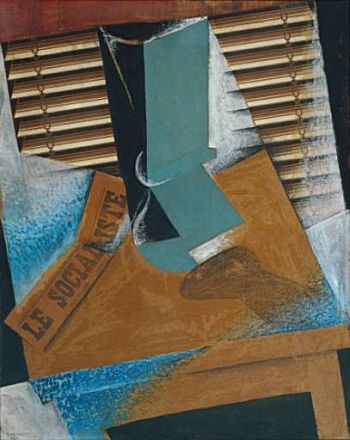
La Jalousie
The Sunblind
1914
Juan Gris
March 23, 1887 - May 11, 1927 167 images
_______________________
On Disobedience - Erich Fromm
If the capacity for disobedience constituted the beginning of human history, obedience might very well, as I have said, cause the end of human history. I am not speaking symbolically or poetically. There is the possibility, or even the probability, that the human race will destroy civilization and even all life upon earth within the next five to ten years. There is no rationality or sense in it. But the fact is that, while we are living technically in the Atomic Age, the majority of men--including most of those who are in power--still live emotionally in the Stone Age; that while our mathematics, astronomy,and the natural sciences are of the twentieth century, most of our ideas about politics,the state, and society lag far behind the age of science. If mankind commits suicide it will be because people will obey those who command them to push the deadly buttons; because they will obey the archaic passions of fear, hate, and greed; because they will obey obsolete clichés of State sovereignty and national honor.(....)
Why is man so prone to obey and why is it so difficult for him to disobey? As long as I am obedient to the power of the State, the Church, or public opinion, I feel safe and protected. In fact it makes little difference what power it is that I am obedient to. It is always an institution, or men, who use force in one form or another and who fraudulently claim omniscience and omnipotence. My obedience makes me part of the power I worship, and hence I feel strong. I can make no error, since it decides for me; I cannot be alone, because it watches over me; I cannot commit a sin, because it does not let me do so, and even if I do sin, the punishment is only the way of returning to the almighty power. In order to disobey, one must have the courage to be alone, to err and to sin. But courage is not enough. The capacity for courage depends on a person's state of development. Only if a person has emerged from mother's lap and father's commands, only if he has emerged as a fully developed individual and thus has acquired the capacity to think and feel for himself, only then can he have the courage to say "no" to power, to disobey. A person can become free through acts of disobedience by learning to say no to power. But not only is the capacity for disobedience the condition for freedom; freedom is also the condition for disobedience. If I am afraid of freedom, I cannot dare to say "no," I cannot have the courage to be disobedient. Indeed, freedom and the capacity for disobedience are inseparable; hence any social, political, and religious system which proclaims freedom, yet stamps out disobedience, cannot speak the truth. ...(more)
.....................................................
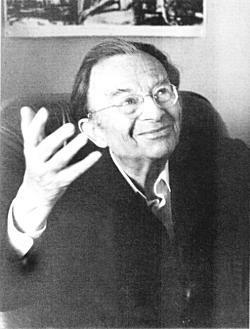
Erich Fromm
(March 23, 1900 – March 18, 1980)
Erich Fromm, ten days before his death, 1980
Photograph by Theo Goldmann
.....................................................
Erich Fromm Archive
The fear of freedom
Erich Fromm
google books
On Being Human
Erich Fromm
google books
On Disobedience and Other Essays: And Other Essays
Erich Fromm
google books
Marx's concept of man
By Erich Fromm, Karl Marx, T. B. Bottomore
Translated by T. B. Bottomore
google books
Beyond the chains of illusion: my encounter with Marx and Freud
Erich Fromm
google books
To Have Or to Be?
Erich Fromm
google books .....................................................
Erich Fromm: Biography
Douglas Kellner
Erich Fromm: his life and ideas : an illustrated biography
Rainer Funk
Translated by Ian Portman, Manuela Kunkel
google books
Erich Fromm, Feminism, and the Frankfurt School
Douglas Kellner
Erich Fromm, Judaism, and the Frankfurt School [pdf]
Douglas Kellner
The Two Voices of Erich Fromm: The Prophetic and the Analytic
Michael Maccoby
Fromm, Freud, and Midrash
Elliot B. Gertel
Judaism , Fall, 1999
_______________________
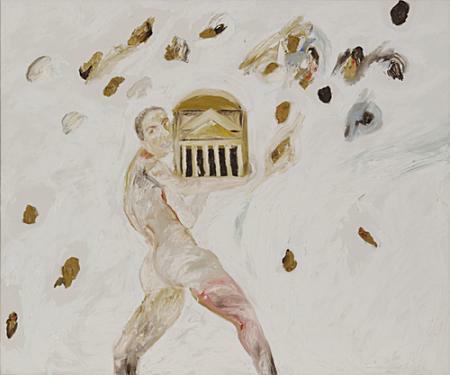
Perseverance
Francesco Clemente
b. March 23, 1952
_______________________
Refusals and Passions
Raoul Vaneigem
Translated from the French by NOT BORED!, 28 October 2003
Each instant we are enjoined to be servile and obey the mechanistic economics that govern the commodity. Steadily, we agree to get used to manipulated objects, to being sold on the employment market, according to the criteria of saleability, competition, competitiveness, exchange, price, spectacular packaging. Against this economized life, which conditions us both psychologically and physically, I try to break the boredom of the routine, the choices imposed on me every minute, in a labyrinth of possibilities that opens or closes according to my own dispositions and the imperatives of the dominant world. I am conscious of the wanderings of the desires and annoyances, meanderings and impasses that form my destiny. I amuse myself by uncovering the meaning of my gestures, furtive thoughts, dreams. I orient in my favor the roads that come to me, guided by the only care of taking pleasure and becoming better according to an alchemy in which misfortune becomes a raw material to be transmuted....(more)
_______________________
The Strategy of Refusal
Mario Tronti
_______________________
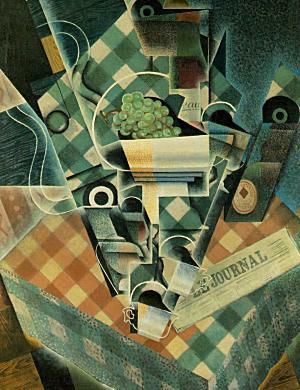 Juan Gris
_______________________
Between story and truth
Jean-Luc Nancy
Translated from the French by Franson Manjali
the little magazine
Sometimes it is literature which conducts the mourning that philosophy endures or denies. Sometimes it is philosophy which sustains the absence that literature fakes. But the gesture of one can also be the fact of the other. There can even be a philosophical poem which is spent up in the desire of the other: Zarathustra concludes by exclaiming: "Do I then strive after happiness? I strive after my work." And there may be a thought, tied irreligiously to its verses addressed to Venus, which concludes thus its convulsively written, red-hued song of nature:
Upon the pyres erected for others,
With a loud uproar the men placed their own kinsfolk
Applied the torches, engaged in bloody struggles,
Rather than abandon the bodies.
Do not abandon the bodies, even if the work is to be shunned. Such is the task. Do not abandon the bodies of gods without wanting to call back their presence. Do not abandon the service of truth nor that of the figure, without however, filling up with meaning the gap that separates the two. Do not abandon the world, which becomes always more world, more under the spell of absence, more in interval, incorporeal, without saturating it with signification, revelation, proclamation or apocalypse. The absence of gods is the condition for both literature and philosophy to be in. It is the in-between which legitimates the one and the other, both of which are irreversibly atheological. But they both have the responsibility of taking care of the in-between: of guarding its open body, and of allowing it the possibility of this opening....(more)
_______________________

Man in the Cafe
1912
Juan Gris
_______________________
Vision
Richard Outram
1930 - 2005
We walk into the light. And halt before
The elemental boundary of the shore.
I note the clear attention with which you,
Sensible as always of the true
Quality of stone, select with care,
Discarding several from many there,
A biscuit-thin, magenta, almost flat
Oval of Precambrian granite that
The sands have polished: and out on the calm
Water, from the circle of your palm
Send expertly, bent sideways, underhand,
An arc of fire-circles on a cloth of light!
Behold, all brilliant filament, a bright
Momentum is extended to the last
Gathered ring's diminishing! So cast,
In vision suffered to assume the blest
Immediate particular, we come to rjest,
Beyond the burdened self, an instant, spent
Upon the body of the evident.
Richard Outram Broadsheets
Richard Outram: A Preface
Peter Sanger
The Antigonish Review
Richard Outram poems
The Drunken Boat Spring 2001
 Agnes Martin
Drawing the Line
Rosamond Bernier on Agnes Martin
photographs by Mary Ellen Mark
VOGUE November 1992
 Agnes Martin
(March 22, 1912 – December 16, 2004)
Photograph by Timothy Greenfield-Sanders
_______________________
The Disappearance of the Outside
An interview with Andrei Codrescu
Simeon Alev
Historically, as we all know, true shamans and spiritual people have been shunned by most communities. They have been ostracized. The shamans had to live in a tree and they were dirty and frightful people, and when they came to the edge of the village, it was only the fact that they had spiritual and healing powers that kept the people from beating them with sticks and destroying them. And it seems to me that the shaman's perspective is the one from which to question the genuineness of any spiritual package that doesn't transform you into a complete freak who has to eat worms and live in the desert, that allows you to still live in your community and not be an outcast. Because a palatable spiritual package, to me, runs the danger of not having enough energy or of not being spiritual enough-an effect of being pretty much just a dilettante's dabbling in superstition. I really think that the genuinely spiritual person is dangerous, and charged with a kind of frightful energy and antisocial power. And when they appear, they will be shunned....
I sort of associate Deepak Chopra with a whole slew of somewhat spiritual inspirational speakers that all the corporations in America are now very interested in because they single-handedly inspire bored workers and management to renewed energy which, of course, they will then put into the company. I'm not sure what that's all about, but I am sure that a large corporation doesn't hire a spiritual person in order to sabotage or create anarchy among its operations. They just sort of take a refresher course in, you know, getting in touch with what makes them happier so that they can be better workers....
Genuine spiritual work, I think, would tend to gum up the works. ...(more)
_______________________

photo - mw_______________________
Running on Emptiness: The Pathology of Civilization
John Zerzan
mediafire download [.doc]
Running On Emptiness : The Failure Of Symbolic Thought
To what degree can it be said that we are really living? As the substance of culture seems to shrivel and offer less balm to troubled lives, we are led to look more deeply at our barren times. And to the place of culture itself in all this.
An anguished Ted Sloan asks (1996), "What is the problem with modernity? Why do modern societies have such a hard time producing adults capable of intimacy, work, enjoyment, and ethical living? Why is it that signs of damaged life are so prevalent?" According to David Morris (1994), "Chronic pain and depression, often linked and occasionally even regarded as a single disorder, constitute an immense crisis at the center of postmodern life." We have cyberspace and virtual reality, instant computerized communication in the global village; and yet have we ever felt so impoverished and isolated?
Just as Freud predicted that the fullness of civilization would mean universal neurotic unhappiness, anti-civilization currents are growing in response to the psychic immiseration that envelops us. Thus symbolic life, essence of civilization, now comes under fire.
It may still be said that this most familiar, if artificial, element is the least understood, but felt necessity drives critique, and many of us feel driven to get to the bottom of a steadily worsening mode of existence. Out of a sense of being trapped and limited by symbols comes the thesis that the extent to which thought and emotion are tied to symbolism is the measure by which absence fills the inner world and destroys the outer world.
_______________________
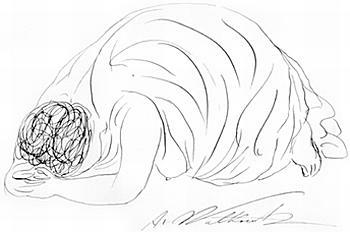
Line Dance
Abraham Walkowitz's Drwaings of Isadora Duncan Abraham Walkowitz
1878-1965
_______________________
Hazard Response
Tom Clark
As in that grey exurban wasteland in Gatsby
When the white sky darkens over the city
Of ashes, far from the once happy valley,
This daze spreads across the blank faces
Of the inhabitants, suddenly deprived
Of the kingdom’s original promised gift.
Did I say kingdom when I meant place
Of worship? Original when I meant
Damaged in handling? Promised when
I meant stolen? Gift when I meant
Trick? Inhabitants when I meant slaves?
Slaves when I meant clowns
Who have wandered into test sites? Test
Sites when I meant contagious hospitals?
Contagious hospitals when I meant clouds
Of laughing gas? Laughing gas
When I meant tears? No, it’s true,
No one should be writing poetry
In times like these, Dear Reader,
I don’t have to tell you of all people why.
It’s as apparent as an attempted
Punch in the eye that actually
Catches only empty air — which is
The inside of your head, where
The green ritual sanction
Of the poem has been cancelled.
Thirteen poems
Tom Clark
jacket
_______________________

Lanark sugarbush
photo - mw
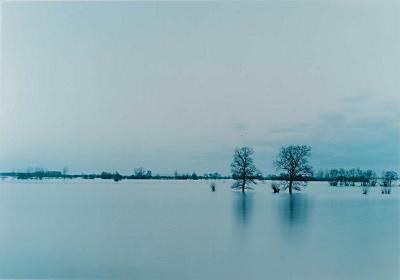 Doubt, Frankreich
Elger Esser
1999 1 2 3 4 5
_______________________
A Drink Of Water
Seamus Heaney
She came every morning to draw water
Like an old bat staggering up the field:
The pump's whooping cough, the bucket's clatter
And slow dimineundo as it filled,
Announced her. I recall
Her grey apron, the pocked white enamel
Of the brimming bucket, and the treble
Creak of her voice like the pump's handle.
Nights when a full moon lifted past her gable
It fell back through her window and would lie
Into the water set out on the table.
Where I have dipped to drink again, to be
Faithful to the admonishment on her cup,
"Remember the Giver," fading off the lip.
One of two poems chosen by Seamus Heaney to sum up his lifetime achievement
_______________________
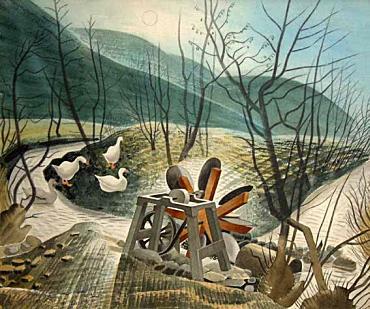
Eric Ravilious
1903 - 1942
1 2 3
_______________________
Charm
Struan Gray
Twiglog
The black sheep of the contemporary arts family is commonly supposed to be beauty, but if you are truly determined to be erased from the Blackberries of your creative friends and relatives you should try putting in a good word for charm. The drama-free, accessible beauty of small gestures and quiet moments, charm is simply too nice, an embarrassment best left to historians of the eighteenth century and the home styling pages of middlebrow newspapers. True art is not supposed to be comfortable or easy to live with - it should challenge! address! engage! - and the vital processes of discourse and narrative are expected to convince by argument and assertion, not rely upon the suspect crutches of easy sociability and gentle persuasion.
Charm has an obvious and close relationship with kitsch, and the art world’s wholesale embrace of the lowborn and tacky might make the rejection of charm seem like an inconsistency. The difference however is real, and is at base a distinction of class: charm is the kitsch of the chattering classes. Celebrating authentic kitsch is a way of elevating the decoration of unexamined lives, and it allows the artist as anthropologist to gather credits for revealing overlooked truths. Works with a self-aware artistic charm however, are already recognised for their explicit art value - canonised even - and are found, not in obscurity, but framed in reproduction over a thousand sofas. They present an artist or critic with nothing to do except admit to having joined the consumerist mainstream. There is a certain macho element to the rejection of charm, but also a combination of aristocratic yearning for singular art objects and the playground desire to be part of the exclusive cool set. All of which leaves these works dangling, acknowledged perhaps as icons, but so ubiquitously appreciated as to be irrelevant.
However, an appreciation of charm can be much more than a milquetoast taste for girls on swings or a way of taking refuge in a tidy list of uncontroversial art talking points. ...(more)
_______________________
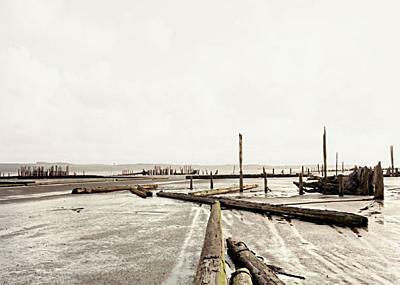
Hoquiam I', USA
Elger Esser
2007
_______________________
Rethinking Academic Discourse
A Poetic Approach to Intellectual Endeavor
Andrea Custodi
My starting point is the postmodern and deconstructive
challenge to intellectual tradition,
which I find powerful and compelling
but not effectively realized
in the works of the theorists who propone it.
If thought is language
then why is it that their language
swamps
obscures
the thrust of their ideas?
They radically undermine
call into question
our most commonly and deeply held assumptions
about the very nature of intellectual endeavor,
yet seem to content to pratter off in endless prose
ornamented with standard academic niceties
adopting the same didactic tone
as the white rational male meta-narrative
they so emphatically refute.
Glaring contradiction.
But not a healthy contradiction,
a contradiction that is gleefully aware of itself
revels in itself
and flaunts itself
to those who would require safe consistency –
this is a contradiction
that challenges those who would be its masters –
for it speaks of neglect
of oversight
of critical lack of self-awareness
of disappointing conventionality
in those whose work
conveys radical potential.
(...)
But if thought is language
how can academic writing
still be so passive, transparent, functional?
If thought is language
how can we justify
obscurity
turgidity
constipation?
If thought is language
how can one
effect
radical
subversion
reconceptualization
through
traditional academic prose?
if we are no longer willing to admit
pre-linguistic thought-reality,
if thought is language,
then writing must become the ideas
it seeks to express –
form and content
must
become
one and the same
and poetry thus presents itself
Rethinking the Human Sciences:
Interdisciplinary Studies, Global Education, and the Languages of Criticism
Janus Head special supplement, 2001
_______________________
 View of a minefield
abandoned Syrian base
Golan Heights, 2007
Infected Landscape
Shai Kremer
1 2 3 4
_______________________
The Will to Technology and the Culture of Nihilism:
Heidegger, Nietzsche and Marx
Arthur Kroker
_______________________
The Terror
Colin Campbell
ctheory
Civilization, we have heard for at least three thousand years, is in decline; its old values have faded, and all that is left is cynical, stupid, short-sighted self-interest.(....)
Fascism in general could be described as a fraudulent attempt, in a decadent world, to return to the values of the past. It is a conservatism as hollow, decadent and modern as the liberal world it makes war upon.
Notwithstanding its hollowness, the idea of decadence has a peculiarly universal relevance as I write these words. For surely, behind every invocation of our 'troubled times', the permanent refrain of panic and economic catastrophe, the old wisdom that 'we have lived beyond our means', is the old critique of decadence, the old prediction of a coming calamity that will punish us for our sins. The sheer scale and ubiquity of the new global financial crisis induce a powerful, hypnotic emotional response, a terror, that would seem all the more clearly to prescribe a stance of unflinching objectivity, reasonability or even an 'audacity of hope.'
But if the prophets of decadence have always been wrong on the question 'what is to be done', this does not mean they are simply wrong....(more)
_______________________

left turn
Shai Kremer
_______________________
Accountability in a time of excess
Sukumar Muralidharan
Himal Southasian
Looking back on the doctrinal foundations of the free-enterprise model – as also the axioms of corporate philanthropy – is to understand how theory is often subverted to suit contingent political interests. Adam Smith is widely believed to have been the father of the notion that the free-enterprise economy has a natural tendency towards maximising social welfare. The truth, however, is quite different. Smith was among the most unflinching observers of the cruelty of the free market towards those without means. As he put it in an early draft of the Wealth of Nations, the wage labourer who “bears, as it were, upon his shoulders the whole fabric of society, seems himself to be pressed down below ground by the weight, and to be buried out of sight in the lowest foundation of this edifice.”
The Wealth of Nations, as finally published, is replete with passages that affirm – without being quite as graphic – the virtual impossibility that the free market will ever ensure a fair bargain for the wage earner. But in sorting out this moral dilemma, Smith chose to put his faith in the progress that bourgeois society, at the time, seemed unmistakably to be showing. His reasoning, though framed in endlessly circumlocutory passages and much tortuous prose, is relatively simple. Bourgeois society was ruthlessly exploiting the working class, but it was also building some durable social assets for future generations. The enhancement of social productivity would be its own reward. And, in the short-term, the cynical exploitation of those without means was perhaps a necessary evil, because it held out longer-term prospects of better opportunities for all.
Over time, it became apparent that the thrift and diligence of the businessman alone was not sufficient to ensure the welfare of the broader mass of society – nor, indeed, for securing long-term social stability and prosperity. This is where the ‘welfare state’ principle stepped in, with its commitment to redistribution through progressive taxation. Among the other features of the welfare state was a mandatory arrangement by which active members of the workforce today would pay for the welfare of senior citizens, as also set apart enough from the national pool of savings to provide for themselves in their years of retirement.
A wide range of arrangements was put in place to make these principles practically realisable. But it does not take much to understand that the consumption boom of the last two decades – financed by running down capital and running up debt – has seriously undermined all the premises of this model of the welfare state. Rather than savings, innovation and accumulation, which were the principles of the bourgeois society that Adam Smith celebrated, the last two decades have enshrined excess. Where once it would have been considered the height of folly to sell the family silver to pay grocery bills – for an individual, a household or for a government – by the late 1990s it seemed permissible to sell one’s own dwelling not once but twice and thrice over, just in order to meet everyday expenses.
The burgeoning of debt across governments, companies and households inevitably takes a bite out of future generations’ prospects and possibilities. The low-taxation regime of the decades of globalisation, far from contributing to greater thrift and investment, has succeeded in mortgaging the future. And corporate social responsibility, which was fashioned as the grand antidote for all of the failings of public policy – and a sure pathway towards social merit for private entrepreneurs – has been as insignificant in relation to the problems it was designed to deal with, as the proverbial drop in the ocean. Its pretensions have evaporated even faster than the plunge in global stock markets....(more)
via 3quarksdaily
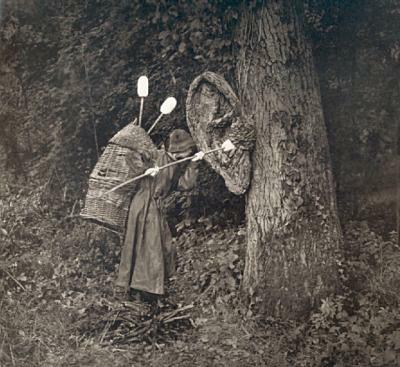
the child and his wood IV
Roberto Kusterle
2005 via roo
_______________________
No Delicacies
Ingeborg Bachmann
translated by Joan Harvey
Nothing pleases me anymore.
Should I
dress up a metaphor
with an almond blossom?
crucify syntax
on a trick of light?
Who would break his head
over such superfluous things?
I have learned some consideration
for words
that are there
(for the lowest class)
hunger
shame
tears
and
blackness.
With rough sobbing
with despair
(and still I despair before despair)
over so much misery,
so many ill, such high cost of living,
I will get by.
I don’t neglect writing
but myself.
The others know,
god knows,
to help themselves with words.
I am not my assistant.
Should I
imprison a thought,
lead it into an illuminated sentence cell?
Feed eye and ear
with choice word tidbits?
Explore the libido of a vowel,
determine the sentimental value of a consonant?
With this battered head,
with a writing cramp in this hand,
under three hundred nights’ pressure,
must I
tear up this paper,
sweep away the contrived word operas,
thus annihilating: I you and he she it
we you?
(Yes, I must. The others must.)
My part must be lost.
a danse macabre supplémentaires classique
featuring exclusive new translations by Joan Harvey
Thanks Zora - mw

Ingeborg Bachmann
(1926 - 1973)
Ingeborg Bachmann
Introduction to the Life and Writings
Karen Leeder
Understanding Ingeborg Bachmann: Bachmann and her critique of postwar Europe
Karen Achberger
google books
Gender, the Cold War, and Ingeborg Bachmann
Sara Lennox
Studies in Twentieth and Twenty-First Century Literature
Reading Ingeborg Bachmann
John Taylor
CONTEXT
Ingeborg Bachmann - Three poems
translated by Johannes Beilharz
jacket _______________________
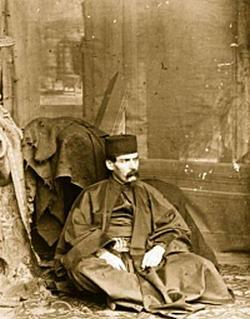
Sir Richard Francis Burton
b. March 19, 1821
Photo by Ernest Edwards/Getty Images
"The more I study religions the more I am convinced that man never worshipped anything but himself."
_______________________
No More Pirate Islands! Media Ecology & Autonomy [pdf]
tobias c. van Veen
Is there autonomy in the 'technological epoch'? Various narratives of philosophy and political theory have long attributed to technology a function of collapse that flattens time and space and reduces the world and its inhabitants to functionaries of an impoverished ontology. Autonomy appears to disappear at this moment. Media ecology proposes that the temporal matter and beings of the world are interlinked in ways that suggest a 'natural technics', suggesting new possibilities for an autonomy that shapes itself in the folds of a mediatized planet.
Modern technology, culminating in the spy satellite, makes this kind of autonomy a romantic dream. No more pirate islands! [...] Are we to live in the present doomed never to experience autonomy, never to stand for one moment on a bit of land ruled only by freedom? Are we reduced either to nostalgia for the past or nostalgia for the future? - Hakim Bey (TAZ 99)
With Hakim Bey we approach perhaps the question of the 'technological epoch': can there be autonomy in an era of highly mediated existence? What does autonomy come to mean in an era of continuous surveillance? Is autonomy irrevocably tied to colonial ideas of the unknown territories? Can there be a new autonomy, and if so, what shapes can it take? InterCulture: An Interdisciplinary Journal
Media Ecologies February 2009 Tobias blogs at
hallucinations & antics //
_______________________
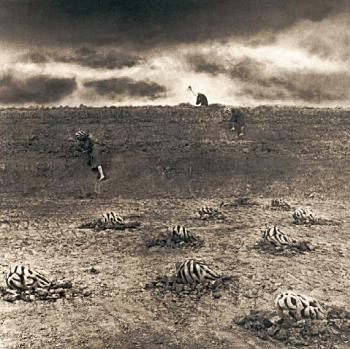
thought harvest
Roberto Kusterle
2006
_______________________
Corporate Fiction
Beware the Madoff Diversion!
Richard Grossman
Corporate directors and managers have long defined how people live, what people do. Sometimes they take their paychecks from their corporations; sometimes, from our governments. For generations, they’ve been writing our laws, propagandizing our children, dictating policy, plundering the planet. To gain such power, they long ago got Congress, federal judges and state legislatures to wrap their corporate bodies in the Constitution of the United States. To bestow upon their corporate “fictions” the authority to govern.(....)
... after the Madoffs of every generation are all locked up, most of the corporate directors and managers who “legally” plunged the nation into these messes continue governing over the nation. They keep instructing people that the source of the nation’s problems is “greed and excesses,” and “crooks.” They keep spending the people’s money to set things right. And they keep writing We the People’s laws. ...(more)
_______________________
Bait and Switch
The Real AIG Conspiracy
Michael Hudson
_______________________

drop on the bottom
Roberto Kusterle
2002
_______________________
In Wide-Ranging Interview, Google Talks Books
Library Journal, 3/13/2009
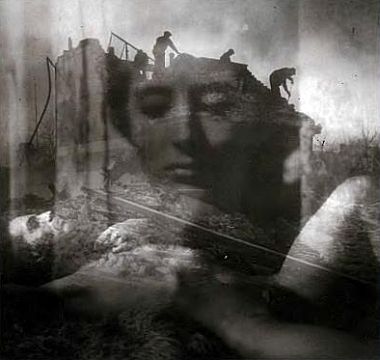
Edmund Teske
1911 - 1996
1 2 3
Darkroom alchemist - photographer Edmund Teske
Mark Alice Durant
Art in America, Nov, 1993
_______________________
Eloquent silence
Ulrich Schmitz
Translated from the German by Allen Mundy
Being silent can be expected of us in one situation and unexpected in another, but it can also be incidental. It is unexpected, for example, when someone giving a speech loses their train of thought or when a confused person is at a loss for words. Silence is expected from an audience listening to a speech or from people in the reading room of a library. Silence is incidental when no one perceives it as silence; all speech is continually and almost imperceptibly interrupted by pauses of various lengths. These are the three forms of non-articulation, in contrast to silence in general. Silence as not-speaking is the absence of articulation, silence generally is the absence of sound. ëHuman silenceí, silence as not-speaking, is thus the linguistic form of silence and is what concerns us here. (Poyatos 1981, by way of contrast, distinguishes between acoustic and kinetic silence.) The following is intended to make the case for a single thesis; namely, that there can be no language nor speech without silence, nor can there be silence without speech (No signs without silence, no silence without signs). Speaking and silence live in a symbiosis; they are dialectically dependent on one another. This appears to be and is a rather simple assertion, yet it necessitates certain conclusions, especially as regards the determination of the subject area of linguistics. What is called for then, is not an essay in praise of silence, although, to be somewhat contradictory, there is much to be said in appreciation of its roles in language....(more)
_______________________
The Aesthetics Of Silence
Susan Sontag
Aspen no. 5+6, item 3
UbuWeb
(....)
The scene changes to an empty room.
Rimbaud has gone to Abyssinia to make his fortune in the slave trade. Wittgenstein has first chosen schoolteaching, then menial work as a hospital orderly. Duchamp has turned to chess. And, accompanying these exemplary renunciations of a vocation, each man has declared that he considers his previous achievements in poetry. philosophy, or art as trifling, of no importance.
But the choice of permanent silence doesn't negate their work. On the contrary, it imparts retroactively an added power and authority to what was broken off; disavowal of the work becoming a new source of its validity, a certificate of unchallengeable seriousness. That seriousness consists in not regarding art (or philosophy practiced as an art form: Wittgenstein) as something whose seriousness lasts forever, an "end," a permanent vehicle for spiritual ambition. The truly serious attitude is one that regards art as a "means" to something that can perhaps be achieved only by abandoning art; judged more impatiently, art is a false way or (the word of the Dada artist Jacques Vaché) a stupidity. (....)
So far as he is serious, the artist is continually tempted to sever the dialogue he has with an audience. Silence is the furthest extension of that reluctance to communicate, that ambivalence about making contact with the audience which is a leading motif of modern art, with its tireless commitment to the "new" and/or the "esoteric" Silence is the artist's ultimate other-worldly gesture; by silence, he frees himself from servile bondage to the world, which appears as patron, client, audience, antagonist, arbiter, and distorter of his work.
Still, in this renunciation of "society," one cannot fail to perceive a highly social gesture. Some of the cues for the artist's eventual liberation from the need to practice his vocation come from observing his fellow artists and measuring himself against them. An exemplary decision of this sort can be made only after the artist has demonstrated that he possesses genius and exercised that genius authoritatively. Having already surpassed his peers, by the standards which he acknowledges, pride has only one place left to go. For, to be a victim of the craving for silence is to be, in still a further sense, superior to everyone else. It suggests that the artist has had the wit to ask more questions than other people, as well as that he possesses stronger nerves and higher standards of excellence. (That the artist can persevere in the interrogation of his art until he or it is exhausted isn't in doubt. As René Char has written, "No bird has the heart to sing in a thicket of questions") (....)
Committed to the idea that the power of art is located in its power to negate, the ultimate weapon in the artist's inconsistent war with his audience is to verge closer and closer to silence. The sensory or conceptual gap between the artist and his audience, the space of the missing or ruptured dialogue, can also constitute the grounds for an ascetic affirmation. Samuel Beckett speaks of "my dream of an art unresentful of its insuperable indigence and too proud for the farce of giving and receiving." But there is no abolishing a minimal transaction, a minimal exchange of gifts, just as there is no talented and rigorous asceticism that doesn't produce a gain (rather than a loss) in the capacity for pleasure. ...(more)
_______________________
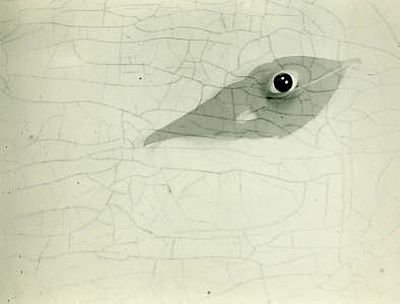
Remembrances of Chinese Kakemone
Josef Sudek
ca1956 Chaos, Mess and Uncertainty: Josef Sudek and Surrealism
Vojtech Lahoda
_______________________
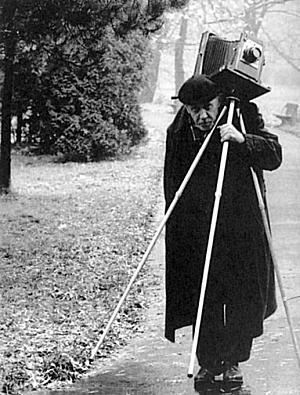
Josef Sudek
b. March 17, 1896
1 2 3 4 5 6 many images available here
Museum of Fine Arts, Boston
_______________________
Vistas of Limbo
Tom Clark
The mind has been largely idle then; yet no one has ever been able to stop it from thinking, even for a little while. And of course this is dangerous. If one doesn't regulate one's thoughts they can easily be yanked by the ear and tugged off in practically any direction; particularly if there's any wishing involved. Maybe it's with this in mind that some thoughtless judges have thought it a crime to think, and declared it so. The nature of the thinking animal however being as it is, it will think anyway, and no matter what punishment be contrived for it in consequence. Vide the French Revolution, and the head of Charlotte Corday, which as those present remarked, retained a thoughtful expression even as it lay before the public, disconnected from its body....(more)
.....................................................
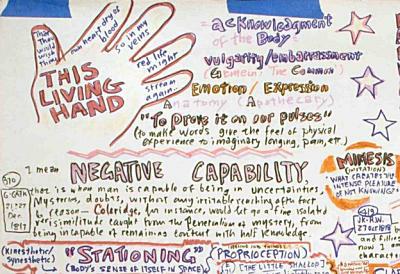
From the Deep Keats Scrolls: Negative Capability
detail
Tom Clark
Beyond the PaleTom Clark's blog
Tom Clark's author profile at jacket
Tom Clark at the Poetry Foundation
Tom Clark's books at Black Sparrow Press
_______________________
The huge difficulty of dying: The Kindly Ones by Jonathan Littell
Steve Mitchelmore
I think we ought to read only books that wound and stab us. If the book we are reading doesn't wake us like a blow on the head, what are we reading for? So that it will make us happy, as you write? Good God, we would be just as happy if we had no books and the kind of books that make us happy are the kind we could write ourselves if we had to. But we need the books that affect us like a disaster, that grieve us deeply, like the death of someone we love more than ourselves, like being banished into forests far from everyone, like a suicide. A book must be the axe for the frozen sea inside us. That is my belief. (Kafka)
Is Les 120 journées de Sodome such a book? Perhaps. But where does this need for axe-like books lead us? Eighteen years later, having written many of his greatest works, Kafka recognised the darkness in the initial romance:
Writing is a sweet and wonderful reward, but for what? In the night it became clear to me, as clear as a child's lesson book, that it is the reward for serving the devil. This descent to the dark powers, this unshackling of spirits bound by nature, these dubious embraces and whatever else may take place in the nether parts which the higher parts no longer know, when one writes one's stories in the sunshine.
This is why Kafka ordered Max Brod to burn his manuscripts, not out of extreme literary scrupulosity or modesty, though these too are close to the writer. Kafka, like Beckett, had counted upon literature to nourish an otherwise emaciated life: "Writing sustains me," he says in the same letter, "but is it not more accurate to say that it sustains this kind of life?".
If Kafka is right and writing is - however hyperbolic it might sound - in unwitting service of devil, then what is the alternative: not writing? What would it mean for the individual striving for what is apparently beyond words to turn away from art yet still seek to defrost the frozen sea? An answer is presented in Jonathan Littell's novel The Kindly Ones. What has so far been received as an historical fiction examining the psychology of genocide is also, and perhaps more significantly, a reiteration of Kafka's revelation....(more)
_______________________
Obama: All in the Game
Mark Kingwell
walrus
Okay, okay — just a human being here. Not a saviour. Not a god. Not a devil either, or an evil genius. Just one man, risen to the top. Risen to the top of a system where the oneness of one man, the oneness of one woman, was the whole idea. Each one counts for one. That’s the basis of the whole shebang, that’s the fundamental tenet. Six billion of us, more, and in theory every single one counting for one. Everything flows from that, everything. Even though right now it was just 300 million or so, the ones with the right photo ID and bank accounts.
We actually know it’s not true. It’s a fiction, this counting for one. A necessary fiction, you thought, standing there. It’s one of those fictions that serve a crucial purpose and therefore are accepted, their untruth converted to value. You might call it a noble lie, a lie with moral sanction. Because nothing would work without it. The whole system would crash if we stopped agreeing to suspend disbelief about this one thing, this basic idea. The whole business would come tumbling down. One counts for one. Even though it doesn’t. And it doesn’t because we’re not equal, in opportunity or access to justice, let alone wealth, any more than in talent or good looks. Because nobody without millions of dollars to spend could even think of standing where you were now. Because one man with dark skin was not about to change the fact that who your parents were accounted for most of what your life would be like, despite the constant claims directly to the contrary.
Those claims had to keep coming, though, and we had to go on believing them, or else everything would falter. You wondered: did we play at democracy the way we play at cards or dice, evening out differences with the mechanisms of chance, with fictional order and accepted rules? Or perhaps as children play, imagining and taking on roles, switching them around, acting them out, pretending? A magical system, a brilliant invention, the best one so far?...(more)
_______________________

Goodbye, Guantánamo
Louie Palu
walrus
_______________________
Image and Artifact: The Photograph as Evidence in the Digital Age
Martha A. Sandweiss
Journal of American History, 94 (June 2007)
The brief essays in this round table collectively explore how photographs can be used to understand the past. Their broad mix of voices—from the archivist and the historian, the photographer and the photographic subject—makes it clear that there is no one way to understand an image. Even a quick reading reveals interpretive tensions: the photographers’ intentions clash with the ambitions of the subjects, and both appear at odds with the needs of the viewers, who bring to the image their own experiences and interpretive concerns. Despite their differences, the essays taken together pose two critical questions. What does a historian need to know to interpret a photograph as a historical document? And how stable are images as records of the past?
The essays by the photographers Ted Engelmann, David Allen, and Jonathan Hyman indirectly raise the issue of whether one must understand the photographer’s intent in order to interpret an image as a historical document. Should it matter to the historian that Engelmann views his photographic work in Vietnam as therapy; that the photojournalist Allen finds his image of an exhausted Oklahoma City rescue worker “heartwarming”; or that Hyman seeks to create an archive of vernacular responses to the events of 9/11? Should it matter that, as Eric Sandweiss argues, the amateur photographer Charles Cushman had “no apparent intended audience” for his fourteen thousand color transparencies of the vernacular American landscape beyond a small circle of intimates? Can one make constructive use of these photographers’ images without considering their personal ambitions for their work?
These essays suggest that understanding a photographer’s motivations can help the historian perceive why an image maker makes certain views and not others, how one picture in a large body of work relates to another. But the essays simultaneously suggest how hard it can be to recover photographic intent and how unsteady it remains as a category of analysis....(more)
courtesy of Americansuburb X
Round Table
American Faces: Twentieth Century Photographs
Journal of American History, 94 (June 2007) subscriber access
_______________________

Parcours
Katrin Schacke
via The Exposure Project
_______________________
white mythology in the white magic
Roger Gathman
Limited, Inc.
We get someplace, and then we wonder why we came here. And we look back and can’t remember our path. And our goal is just to get to the Castle. The Castle is just up the hill. It seems so simple. The parts of our plan are falling into place. But then we look around. Why does everybody look suspicious? Why do we feel like we have to keep talking? What do we want? What office do we hold? Who invited us here?
Why am I talking about myth and folklore in the context of happiness? (....)
I seem to be finding that the cutwork for the creation of ‘resistance’ to the great tradition – to the turn it takes as it embraces happiness as the emotional heuristic by which to understand the normal human personality and as the hinge that connects the governors and the governed – comes back to a series of trips. Trips, flights, the assumption of peripheral positions, holings up, going underground. And then there are those who want to be, who make themselves be central – like Goethe. And yet who find themselves irresistibly drawn to the erotically marginal. I like to think of Goethe traveling to Italy in 1783, planning it as an escape, telling no one, even – especially – his heavy handed muse, Diotima, Charlotte von Stein, to whom he addresses his notes on Italy (as though he had to allot her a place in his head even as he was escaping from her person), while – perhaps mythically – Potocki is traveling too – around the Ottoman empire.
As without, so within – and within the white magic, what are we going to find if not the White Mythology? Within the idea that backwards is equal to forwards, that the path up and the path down are one and the same – the Heraclitean compromise position on ontology, it is here that we find the altered antiquity of the moderns, myth for the modern man. But antiquity, classicism, myth, folklore also open up a space in which to contest the modern. That’s the double aspect of it.
Which is why I am presently following/reading – Sneaky pete, the amateur historian – in the heels of Goethe in Italy at the moment. ...(more)
_______________________

Parcours
Katrin Schacke
_______________________
The Half-Forgotten Prophet: C. Wright Mills
Norman Birnbaum
Mills was the self-designated survivor of a tradition of large historical and social criticism in American sociology that had largely disappeared by the time he apprenticed himself to it. (....)
Apart from his many books, Mills published articles, polemical letters and reviews in an unending stream, lectured widely and corresponded with critics and friends ceaselessly until his death, at age 45, in 1962. John Summers, who has been working with the Mills legacy for years, has done us the large service of collecting in The Politics of Truth many essays, lectures and sketches. Summers provides an ample biographical sketch of Mills as well as a first-rate representative selection of his occasional writing. Perhaps, however, the phrase "occasional writing" is inappropriate. The themes of Mills's major works are quite visible in his shorter pieces--some of which offer hints of works he might have written. And some of the shorter pieces appeal precisely by virtue of their unfinished quality: we see a painstaking intellectual workman at his bench. The figure of speech is apt: Mills was a master craftsman who built his own house in Nyack, outside New York City. His intellectual work was artisanal, the sequence self-consciously defined: the design of a project, the assemblage and testing of materials, followed by construction, step by step. In the one case the product was a building, in the other an in-depth account of self-serving corporatism. Mills was also a photographer. His takes of the surface of our lives were often sharply, even cruelly, etched. He did not, however, stop at appearances and insisted that surface and body, event and larger process, incident and structure, were inseparable.
What can be said of Mills in his time, now that the time is past? ...(more)
_______________________

Flowergirl By suss51lussGraffiti Ren
Classical art. Modern graffiti.
contest at Worth1000 via mirabile dictu
_______________________
The Information Bridge:
DOE Scientific and Technical Information provides free public access to over 200,000 full-text documents and bibliographic citations of Department of Energy (DOE) research report literature.
Science Accelerator
searches science, including R&D results, project descriptions, accomplishments, and more, via resources made available by the Office of Scientific and Technical Information
via resource shelf
D-Lib Magazine (March/April 2009)
Toward Digitizing All Forms of Documentation
George V. Landon
Profiling Social Networks
A Social Tagging Perspective
Ying Ding and Elin K. Jacob et. al.

imported landscape Petur Thomsen
_______________________
Living Inside The Kindly Ones
Charlotte Mandell
Beatrice
People talk about ‘free translation’—and they usually mean something that I’d judge sloppy or pretentious. For me, my real freedom as a translator is to follow strictly, alertly, joyfully, the moves and rhythms of the original text. I want the reader to know exactly what the author thought—and when he thought it. That means I want the translation to present ideas, images, events in as close as humanly possible to the order in which those ideas, images, events occur in the original. I want the reader to hear the author think.(....)
... the horrors that Max Aue encounters on the way surprise and shock me as I come upon them, but the shock of discovery becomes the shock of inscription: being shocked into saying these things anew in my native language. In reading through the more horrifying, scarifying parts of the book (Stalingrad, Auschwitz, the underground factories), the revulsion one feels at the gross descriptions is curiously checked, held in suspension, by the immense detail of bureaucracy and administrative chicanery.
Of course there are perils in my way of working, but they are perils the reader shares. The Kindly Ones Jonathan Littell Charlotte Mandell (Translator) amazon
_______________________

Q. Sakamaki
via Andrew Abb
_______________________
...the goal really—the goal is really to bring America to a closer resemblance to Indonesia. The goal is to avoid Denmark and get Indonesia. I mean, they say things like that. In 1978, a number of these financiers came out and said, “This country is just heading for a social democracy, and we don’t want that.” I mean, they used the term “social democracy.” They’re aware of these things. A few months ago in The New Yorker, there was an article about how Republicans had a loss for issues, and one of them said, “Well, the reason we’re at a loss is because we’ve accomplished all we wanted to. We’ve destroyed the social democracy.” And that’s their goal.
And if you listen to them now, I mean, it’s fascinating and outrageous. They’re talking about doing nothing, just putting a cap on all spending, that the market is in a stage of correction. They use terms like “correction” or “adjustment.” They don’t mind recessions. Recessions are fine. It allows them to buy up smaller companies at bargain prices. It disciplines labor. It humiliates and beats back people. And this, I think, is what we’re facing. And I’m infuriated by the Republicans in the Congress and the way they’re going at this. The only passion they show is to protect the tax cuts for the super rich. That seems to be the only interest they have.
The free market does not work. It's not free. It's not really a market; it's a plunder. And it has to be done away with.
- Michael Parenti
_______________________

Platt's Views
c. 1880s
Nantucket Historical Association on flickr
via AKMA
_______________________
Two Poems by Friedrich Hölderlin
Walter Benjamin
Translated by StanleyCorngold
pdf here
The evaluation cannot be guided by the way the poet has fulfilled his task; rather, the seriousness and greatness of the task itself determine the evaluation. For the task is derived from the poem itself. The task is also to be understood as the precondition of the poem, as the intellectual-perceptual [geistig-anschaulich] structure of the world to which the poem bears witness. This task, this precondition, shall be understood here as the ultimate basis accessible to analysis. Nothing will be said here about the process of lyrical composition, nothing about the person or world view of the creator; rather, the particular and unique sphere in which the task and precondition of the poem lie will be addressed. This sphere is at once the product and the subject of this investigation. It itself can no longer be compared with the poem; it is, rather, the sole thing in this investigation that can be ascertained. This sphere, which for every poem has a special configuration, is characterized as the poetized [das Gedichtete]. In this sphere that peculiar domain containing the truth of the poem shall be opened up. This "truth," which the most serious artists so insistently claim for their creations, shall be understood as the objectivity of their production, as the fulfillment of the artistic task in each case. "Every work of art has in and of itself an a priori ideal, a necessity for being in the world" (Novalis). In its general character, the poetized is the synthetic unity of the intellectual and perceptual orders. This unity gains its particular configuration as the inner form of the particular creation.
Walter Benjamin and Romanticism
Beatrice Hanssen, Andrew E. Benjamin google books
Benjamin's magnificent essay, "Two Poems by Friedrich Hölderlin ...performed a critical potentiation as it traced the 'poetized' through a comparative reading of Holderlin's two odes, closing with a positive appraisal of the metaphysics of absolute, sober connections realized in 'Timidity'.
_______________________
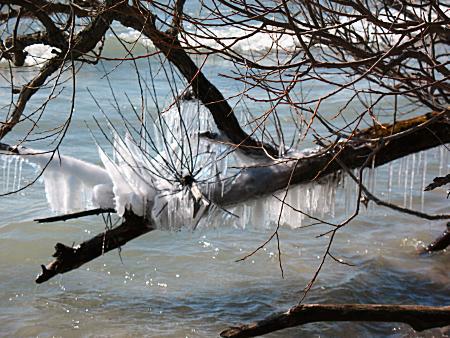
photo - mw
Presqu'ile
_______________________
Draft 94: Mail Art
Rachel Blau DuPlessis
Introduction
Mail Art is/was an international artwork activity, emerging from movements like Dada and Fluxus. It was a communication and gift exchange, before internet and email, sent through the post, in which every aspect of the communiqué (from the envelope on in) had a collage aesthetic and playful, verbally inventive, and jaunty elements. Among the features that I can’t replicate in this work are the joking extra postage stamps often from odd countries like Canadada, the rubber stamps all over envelopes, the extra-national postal services (Fluxpost), and the textual materiality of the collage. Yet this work is an homage to and recollection of Mail Art from inside Drafts....(more)
_______________________

photo - mw
_______________________
From Thomas the Obscure
Maurice Blanchot
courtesy of Andrew Seal
Blographia Literaria
Rather than withdraw from a text whose defenses were so strong, he pitted all his strength in the will to seize it, obstinately refusing to withdraw his glance and still thinking himself a profound reader, even when the words were already taking hold of him and beginning to read him. He was seized, kneaded by intelligible hands, bitten by a vital tooth; he entered with his living body into the anonymous shapes of words, giving his substance to them, establishing their relationships, offering his being to the word "be." For hours he remained motionless, with, from time to time, the word "eyes" in place of his eyes: he was inert, captivated and unveiled. And even later when, having abandoned himself and, contemplating his book, he recognized himself with disgust in the form of the text he was reading, he retained the thought that (while perched upon his shoulders, the word He and the word I were beginning their carnage) there remained within his person which was already deprived of its senses obscure words, disembodied souls and angels of words, which were exploring him deeply....(more)
_______________________

photo - mw
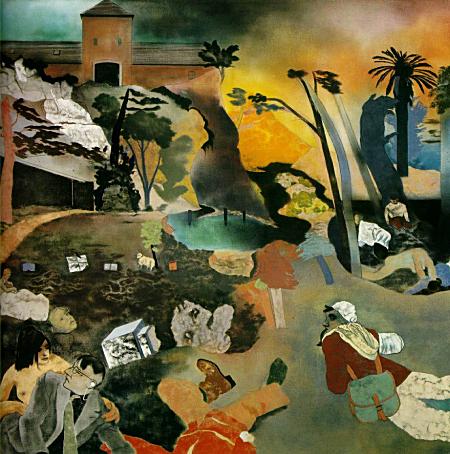
if not, not
R.B. Kitaj
_______________________
If Not, Not
Michael Palmer
They tell each other stories,
lies composed as dreams and
always in the colors of
dreams: rust, chrome yellow, coral,
chemical green. Of the dying
figures, loosely assembled, by a
riverbank. The gatehouse. A journey
by train through beautiful countryside,
indescribable countryside. I was there
cut in half, only to
survive. A young dancer, standing
at the third-floor window. Cobalt
blue, argentine, bone white. What
we called that hour in
those days. He means to
say that on that same
hill Goethe and Eckermann would
sometimes walk. "Always the old
story, always the old bed
of the sea!" He means
to say, The music of
moths, the small lamps. She
stares from the window on
the third floor, toward the
square below. He says, These
are yellow-hammers and sparrows, but
there are no larks. Come
Whitsuntide, the mockingbird and the
yellow thrush will arrive. Here
at the heart, a small
pond, stagnant in the shadow
of smoke. The late flowers.
Michael Palmer at The Poetry Foundation
Michael Palmer at PennSound_______________________
neo-liberalism, or the vorovskoy mir in action: a bedtime tale for demons
Roger Gathman
news from the zona
Oh, the dirty tales we can tell of this brave new world – the world its prophet, its reflection, its mediocrity, its voice Thomas Friedman called, justly, the “flat world” – for indeed, all heads, all minds, all hearts were flat in this world, flat as soda when the fizz has gone out of it and left behind a toxic industrial syrup laced through with sugar substitutes. Drink it up! Oh, drink it all up, every last drop, zeks!
Such are the rules in the zona. The flat world has another name, a more secret one perhaps: vorovskoy mir – the thieves world. The bankrobbers who have graduated in their masses from the Ivies best business schools have built ever more elegant algorithms on the approved vorovskoy mir model, algorithms that have produced a flat utopia. Here flat is a word that signifies an act – as in a tire going flat. Every one of us is caught within its rubbery coils – can’t you smell them? It that rubber, in endless amounts, that is being rubbed in our faces.
Thus, to understand the zona, it isn’t enough to read the business pages – one must go back to texts like Pushkin’s The Captain’s Daughter, which is, I believe, the first instance of the vorovskoy mir bursting into the pages of the classics, through the use of Fenya, or thief’s slang. And haven’t we grown used to our own fenya, that of the financial market, where the letter killeth? Of course we have. We are the geeks. We swallow everything. We wait for the next course....(more)
_______________________
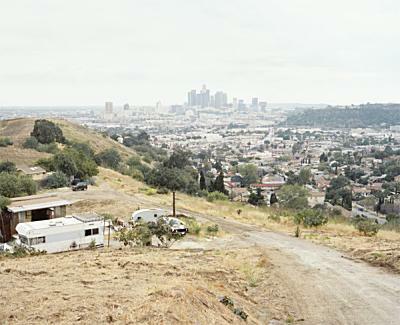
happy valley
on edge Karin Apollonia Müller via The Exposure Project
_______________________
Sun
Michael Palmer
Write this. We have burned all their villages
Write this. We have burned all the villages and the people in them
Write this. We have adopted their customs and their manner of
dress
Write this. A word may be shaped like a bed, a basket of tears
or an X
In the notebook it says, It is the time of mutations, laughter at
jokes, secrets beyond the boundaries of speech
I now turn to my use of suffixes and punctuation, closing Mr.
Circle with a single stroke, tearing the canvas from its wall, joined
to her, experiencing the same thoughts at the same moment,
inscribing them on a loquat leaf
Write this. We have begun to have bodies, a now here and a now
gone, a past long ago and one still to come
Let go of me for I have died and am in a novel and was a lyric poet,
certainly, who attracted crowds to mountaintops. For a nickel I will
appear from this box. For a dollar I will have text with you and
answer three questions
First question. We entered the forest, followed its winding paths,
and emerged blind
Second question. My townhouse, of the Jugendstil, lies by
Darmstadt
Third question. He knows he will wake from this dream,
conducted in the mother-tongue
Third question. He knows his breathing organs are manipulated by
God, so that he is compelled to scream
(....)
A word is beside itself. Here the poem is called What Speaking
Means to Say
though I have no memory of my name
Here the poem is called Theory of the Real, its name is Let's Call
This, and its name is called A Wooden Stick. It goes yes-yes, no-
no. It goes one and one
...(more)
_______________________

Another anniversary
The My Lai massacre
March 16, 1968
The names of the deceased are followed by their age and sex. A brief tally shows that 50 of the people were three years old or younger, 69 were between the ages of four and seven, 91 were between eight and twelve, and 27 were in their seventies or eighties.
-
The 504 People Killed in the My Lai Massacre
_______________________
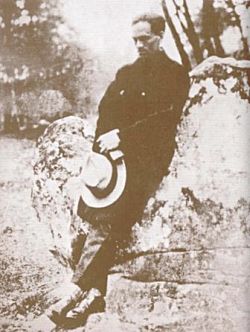
César Vallejo
March 16, 1892 – April 15, 1938
I Am Going To Speak Of Hope
I do not suffer this pain as César Vallejo. I do not ache now as an art-
ist, as a man or even as a simple living being. I do not suffer this pain as a
Catholic, as a Mohammedan or as an atheist. Today I simply suffer. If my
name were not César Vallejo, I would still suffer the very same pain. If I
were not an artist, I would still suffer it. If I were not a man or even a living
being, I would still suffer it. If I were not a Catholic, atheist, or Muham-
madan, I would still suffer it. Today I suffer from further below. Today I
simply suffer.
I ache now without any explanation. My pain is so deep, that it never
had a cause nor does it lack a cause now. What could have been its cause?
Where is that thing so important, that it might stop being its cause? Its cause
is nothing; nothing could have stopped being its cause. For what has this
pain been born, for itself? My pain is from the north wind and from the
south wind, like those neuter eggs certain rare birds lay in the wind. If my
bride were dead, my pain would be the same. If they slashed my throat all
the way through, my pain would be the same. If life were, in short, differ-
ent, my pain would be the same. Today I simply suffer from further above.
Today I simply suffer.
I look at the hungry man’s pain and see that this hunger is so far away
from my suffering, that were I to fast unto death, at least a blade of grass
would always sprout from my tomb. The same with the lover. How engen-
dered his blood is, in contrast to mine without source or consumption!
I believed until now that all things of the universe were, inevitably,
parents or offsprings. But behold that my pain today is neither parent nor
offspring. It lacks a back to darken, as well as having too much chest to
dawn and if they put it in a dark room, it would not give light and if they
put it in a brightly lit room, it would cast no shadow. Today I suffer come
what may. Today I simply suffer.
Ten Poems from Poemas Humanos [pdf]
César Vallejo
translated by Clayton Es-
hleman
janus head
Trilce
César Vallejo
Translated by Clayton Eshleman google books
The Complete Poetry: A Bilingual Edition
César Vallejo
translated by Clayton Eshleman
amazon
César Vallejo - Ten Poems
translated by Clayton Eshleman
fascicle _______________________

Guido Guidi Jarach Gallery
|


 Janus Head
Janus Head
 The Age of Briggs & Stratton
The Age of Briggs & Stratton







































































 It is in fact hard to get the camera to tell the truth; yet it can be made to, in many ways and on many levels. Some of the best photographs we are ever likely to see are innocent domestic snapshots, city postcards, and news and scientific photographs. If we know how, moreover, we can enjoy and learn a great deal from essentially untrue photographs, such as studio portraits, movie romances, or the national and class types apotheosized in ads for life insurance and feminine hygiene. It is a good deal harder to tell the truth, in this medium, as in all others, at the level of perception and discipline on which an artist works, and the attempt to be "artistic" or, just as bad, to combine "artistry" with something that pays better, has harmed countless photographs for every one it has helped, and is harming more all the time. During the century that the camera has been available, relatively few people have tried to use it at all consistently as an artist might, and of these very few indeed could by any stretch of courtesy be called good artists. Among these few, Helen Levitt is one of a handful who have to be described as good artists, not loosely, or arrogantly, or promotively, but simply because no other description will do.
It is in fact hard to get the camera to tell the truth; yet it can be made to, in many ways and on many levels. Some of the best photographs we are ever likely to see are innocent domestic snapshots, city postcards, and news and scientific photographs. If we know how, moreover, we can enjoy and learn a great deal from essentially untrue photographs, such as studio portraits, movie romances, or the national and class types apotheosized in ads for life insurance and feminine hygiene. It is a good deal harder to tell the truth, in this medium, as in all others, at the level of perception and discipline on which an artist works, and the attempt to be "artistic" or, just as bad, to combine "artistry" with something that pays better, has harmed countless photographs for every one it has helped, and is harming more all the time. During the century that the camera has been available, relatively few people have tried to use it at all consistently as an artist might, and of these very few indeed could by any stretch of courtesy be called good artists. Among these few, Helen Levitt is one of a handful who have to be described as good artists, not loosely, or arrogantly, or promotively, but simply because no other description will do.